2 Weeks in Spain: A Perfect Itinerary

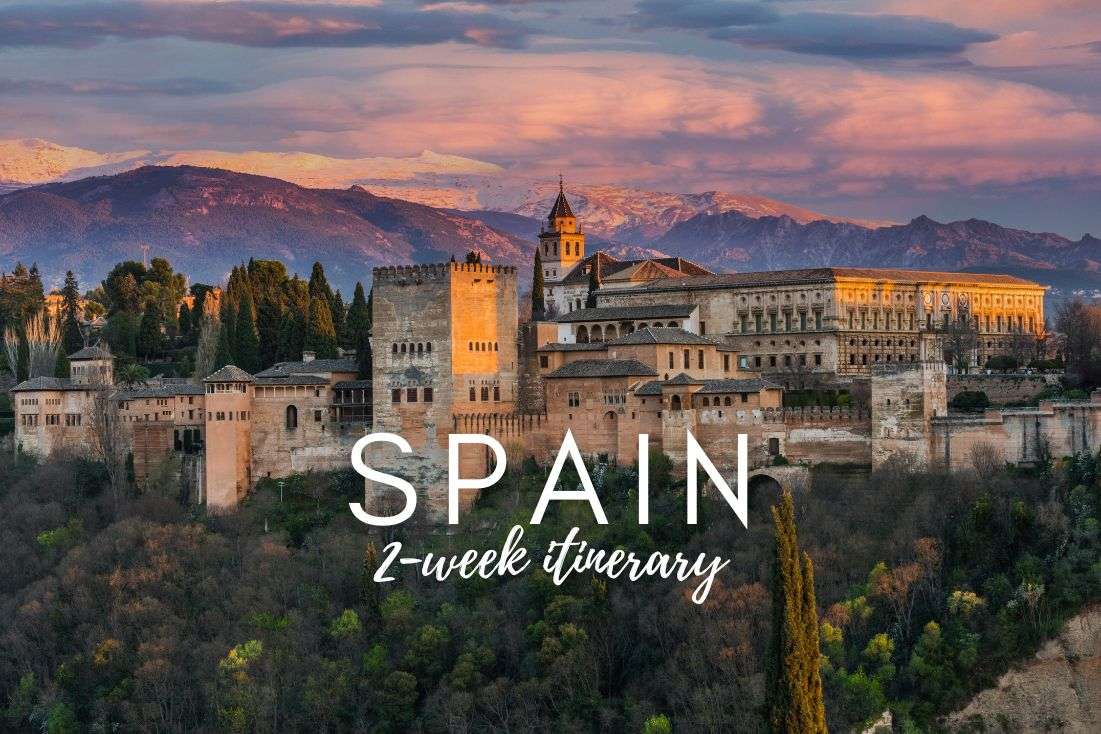
Spain has it all, from tapas and palaces to bulls and... Antonio Banderas? Yeah, why not! Here’s the best 2-week Spain itinerary I could come up with (and I try hard for you people, you know that!), starting in Barcelona and ending in Banderas’ hometown, Malaga.
Before you head out, it seems like a reasonable thing to do to read up on 14 Things To Know About Spain Before You Go.
Disclaimer: There are no guaranteed sightings of famous people in this itinerary. But if you meet Penelope Cruz, tell her I sent you.
You might also be interested in reading:
- Andalusia Itinerary: Southern Spain in 10 Days
- Barcelona Itinerary: 5 days in Gaudí’s Metropole (with day trips)
- All You Need to Know about Spanish Tapas (+Restaurant Tips)
- The 10 Best Museums in Spain’s Top Cities
- The 16 Most Beautiful Beaches in Spain
Spain itinerary map and overview
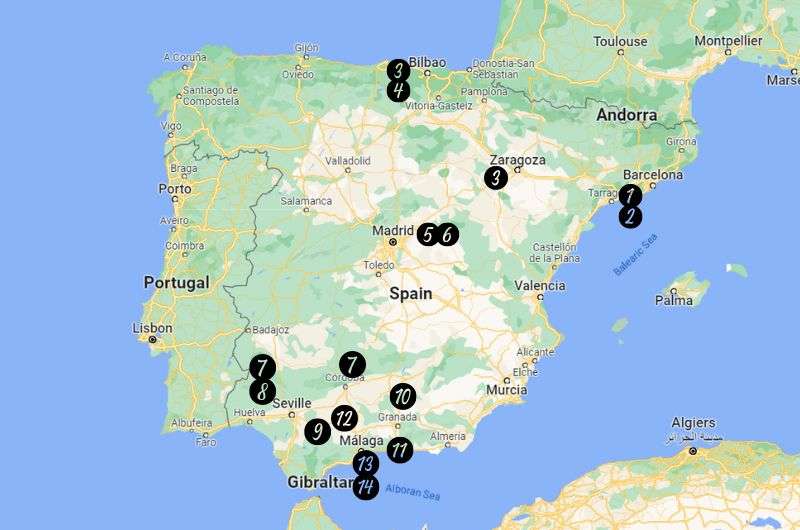
Here’s where you’ll be spending your 14 days in Spain
Getting in and around
Spain is a fairly big country, so the best thing you can do for your sanity is to book an open-jaw ticket. I recommend flying into Barcelona and departing from Malaga. Both have very busy international airports, so it shouldn’t be a problem to find flights to or from either.
I always prefer to rent a car everywhere I travel (with some notable exceptions, like Belgium) to give myself the freedom and comfort of throwing my own stuff into my own trunk and being able to react to every whim really easily. Did I decide to sleep in? Did I decide I hate a place? Did I bump into Penelope Cruz and promise to meet her for a cup of joe?
That said, Spain does have a good system of high-speed trains, so I’d recommend using those for your first week in Spain. A car is a necessity for Andalusia, though, since most places you’ll be visiting are day trips. So, once you get to southern Spain, get a car for the rest of your trip. Spain doesn’t really do the “pick up in one spot and return to another” setup, so you’ll likely need to pick it up in Malaga first so you can return it there at the end of your trip. Pain in the ass but what can you do.
How this itinerary works
At the beginning of the description of each day you’ll find a map, the main stops of the day, my restaurant tips, and some links to my other articles where you can read up on further details.
I’ve also done my best to recommend the best hotels to stay in, all from my personal experience. And I’m a picky sucker!
If there’s only one time you’ll actually listen to me, make it now: The Hacienda Fresneda María by Charming Stay was the best hotel I’ve ever stayed at in Spain. I L.O.V.E.D. it. And they say I have a cold heart.
This is your 2-week Spain itinerary route:
Day 1: Barcelona (sleep in Barcelona)
Day 2: Barcelona (sleep in Barcelona)
Day 3: Zaragoza, Bilbao (sleep in Bilbao)
Day 4: Bilbao (sleep in Bilbao)
Day 5: Madrid (sleep in Madrid)
Day 6: Madrid (sleep in Madrid)
Day 7: Cordoba, Sevilla (sleep in Sevilla)
Day 8: Sevilla (sleep in Sevilla)
Day 9: Ronda (sleep in Malaga)
Day 10: Granada (sleep in Malaga)
Day 11: Nerja (sleep in Malaga)
Day 12: Caminito del Rey (sleep in Malaga)
Day 13: Malaga (sleep in Malaga)
Day 14: Malaga and departure
And now for the detailed version:
Day 1 of Spain itinerary: Barcelona
See this map of day 1 of Spain itinerary so you can just click and walk
Main sites visited on day 1: Barcelona Cathedral, La Rambla, Casa Batlló, La Pedrera, Sagrada Familia, Parc de la Ciutadella
Restaurant tips: Refresc House | Rias do Miño Restaurant | ABaC Restaurant | Raó Restaurant
Hotel recommendations: Radisson Blu 1882 Hotel
Further reading: A walk through Barcelona | Best Beaches of Spain You’ll kick off your 14-day Spain itinerary off in the City of Gaudí—Barcelona. You’ll need 2 days in the city to see all the weird architecture and take in the atmosphere of this seaside destination.
Focus mainly on the Barri Gòtic (Gothic Quarter)—the center of the Old Town of Barcelona. This is where the streets are narrow and everything is wonderfully old. There is no city grid, unlike in the Eixample area outside of the Gothic Quarter that is full of straight lines and right angles, which Gaudi would’ve hated.
This first day of your Spain itinerary follows my “Walk through Barcelona”, so hop on over there for the deets on all of the places you need to see.
Here’s the basic route:
Day 1—Barcelona—stop 1: Around the Cathedral
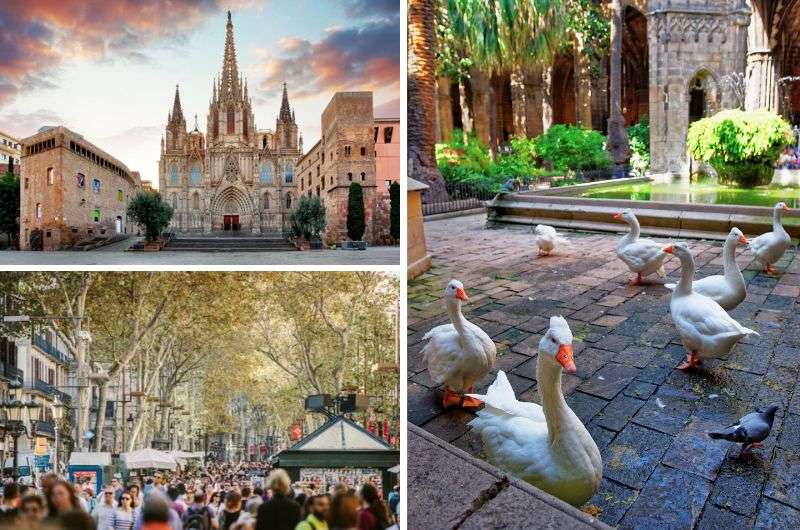
Cathedral of Barcelona, the geese in the courtyard and the nearby La Rambla
Time spent here: 1 hour
Start your walk at the dark and Gothic Cathedral of Barcelona.
When you go inside, don’t forget to count the geese in the courtyard (there are 13 of them) before you take the elevator up to the rooftop. Now this is the perfect beginning to your Spain itinerary!
- Barcelona Cathedral official website
- Google Maps link
- Open weekdays 9:30 am–6:30 pm (no entrance after 5:45 pm), Saturdays 10:30 am–5:15 pm (no entrance after 4:30 pm), Sundays 2 pm–5 pm (no entrance after 4:30 pm)
- Tickets cost EUR 9 and include rooftop access
Right in front of the cathedral is a smaller historical building, La Casa de l’Ardiaca, which houses the city archives. There is no entrance fee, and it only takes a little while to look around the courtyard. It feels like you found a secret garden!
Then continue to get lost in the little streets, they’re all full of character.
Day 1—Barcelona—stop 2: Around La Rambla and lunch
Time spent here: 1 hour plus lunch
La Rambla is the 1.4 km (1 mile) long tourist street of the Gothic Quarter. Expect street performers, crowds and overpriced everything. I’d recommend walking in the side streets instead of trying to brave the madness.
It’s where you’ll find the vibrant public market, Mercado de La Boqueria. Even if you just browse, I find visiting a market is a great way to get a feel for a city. Before continuing your walk, grab a cheese and meat cone or a fruit salad from one of the many vendors.
If you’re ready for a proper sit-down lunch, my tip is RAO Restaurant a little further north. It is one of the best tapas bars we found in Barcelona. Read more about the best restaurants in Spain.
Day 1—Barcelona—stop 3: Casa Batlló
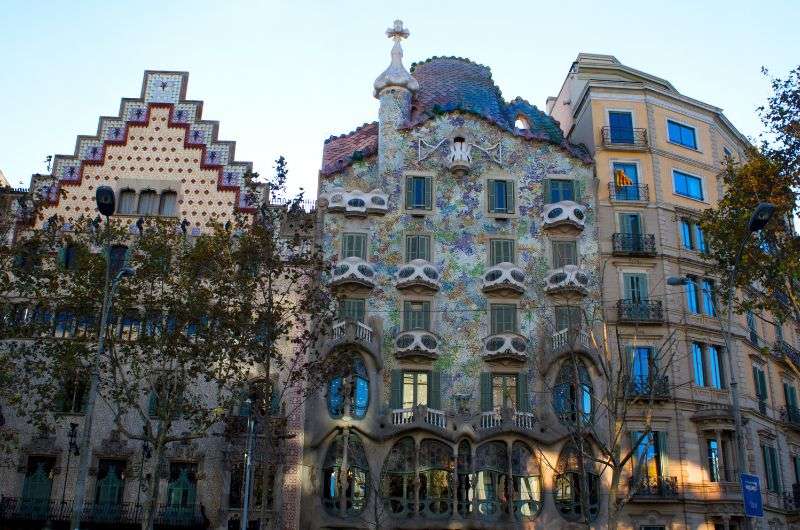
Our fave Gaudí buildings, Casa Batlló
Time spent here: 1.5 hours
Once you get to Plaça de Catalunya at the end of La Rambla, everything is suddenly bigger and newer and more perpendicular.
Casa Batlló is located on a major shopping avenue (Passeig de Gràcia), so no worries if you forgot your night cream, there’s a Sephora just a couple houses down.
You’ll want to go on the self-guided tour. It takes you from the basement all the way to the dragon’s back aka the tiled rooftop and includes several very cool multimedia installations in the “Immersive Rooms” that you won’t want to miss.
Make sure you have 1.5 hours to see it. Buy your time-stamped tickets in advance, because they do sell out.
- Casa Batlló
- Passeig de Gràcia 43.
- Open daily 9am–8:30pm
- Tickets cost from €29 if you buy in advance online, it costs EUR 4 extra to buy a ticket at the door.
Day 1—Barcelona—stop 4: Casa Milà aka La Pedrera
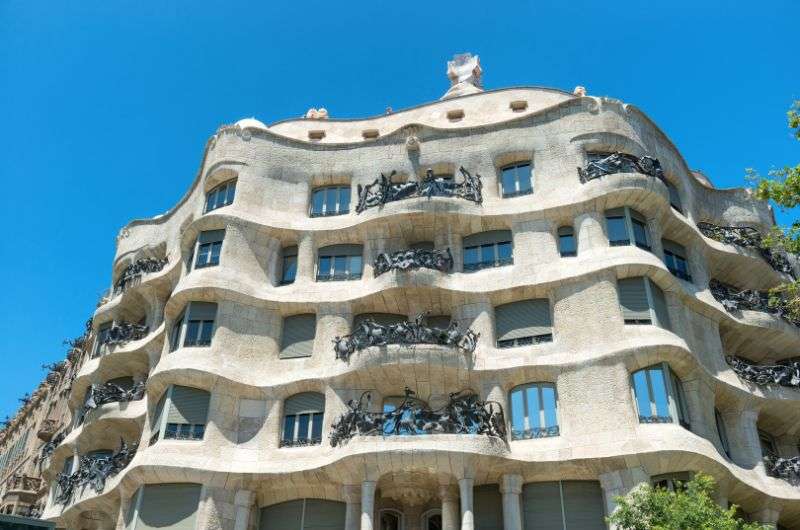
Casa Milà
Time spent here: 1.5 hours
The stores get more and more high-end as you continue walking up Passeig de Gràcia. You pass Cartier, Prada, Versace and then voila, another Gaudí masterpiece, the Casa Milà (aka La Pedrera) stands before you.
It’s the only Gaudi interpretation center in Barcelona—essentially a museum that teaches you about Gaudí’s work and inspiration. It’s a superb museum and I go whenever I am in Barcelona. I’m especially fond of the attic—you'll feel like you’re inside a whale!
If you want to dive into the curious brain of the artist that makes Barcelona so special, go for it.
The basic tour is self-guided and takes you through the interior, the courtyards, and the roof. You’ll need 1.5 hours and an audio guide (don’t go without it!). Get your ticket online for better prices.
- La Pedrera official website
- Google Maps link
- Open daily 9am–6:30pm
- Tickets from EUR 25
Day 1—Barcelona—stop 5: Sagrada Familia
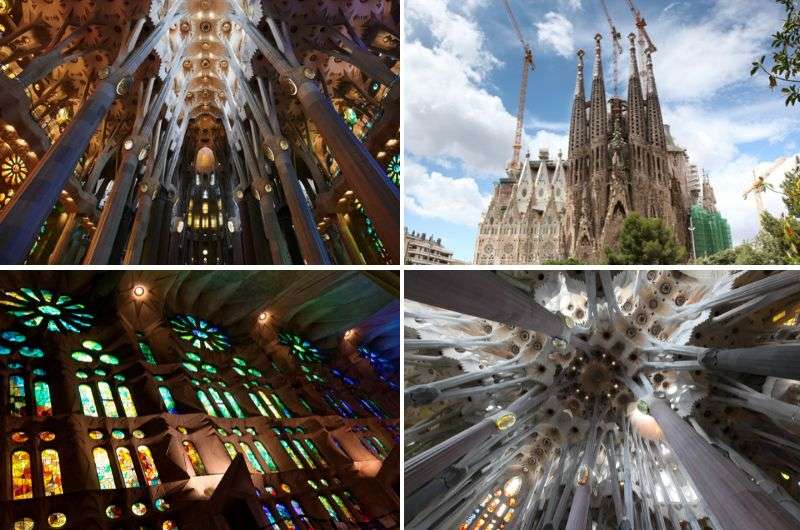
The unbelievable architecture of Sagrada Familia. At first glance, the interior of the Sagrada Familia is the work of Gaudí.
Time spent here: 1 hour
And now, Gaudí’s biggest and still unfinished project, the Sagrada Familia. This renowned church is set to be completed in 2026, 100 years after Gaudí’s death. Finger’s crossed!
Gaudí himself is buried in the crypt inside the basilica. Not sure much that constitutes RIP, but maybe he doesn’t mind the construction noise?
Sagrada Familia is a 20-minute walk through some busy streets from La Pedrera. It’s so big that the large square it’s on feels almost too small.
The exterior of Sagrada Familia is certainly spectacular, but then you go inside and you have to give a little touché to the man. It’s very… organic! Gaudí was famously inspired by nature, and it really shows in Sagrada Familia.
Spend 1 hour to look around and say hey to Gaudí.
Important: You’ll need to download the official app to manage your tickets. I didn’t have it my first time in Barcelona and was denied access.
- Open daily 9 am–6 pm
- Tickets start from EUR 26
Day 1—Barcelona—stop 6: Parc de la Ciutadella and the beach
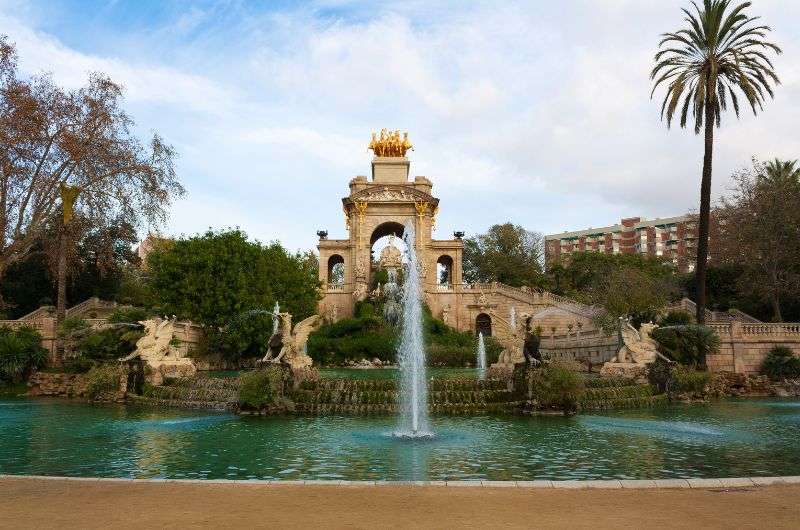
Cascada del Parc de la Ciutadella
Time spent here: as long as you want
End your day at Parc de la Ciutadella back down by the Old Town. As you enter through the massive Arco de Triunfo de Barcelona, you’ll feel like you’ve conquered Barcelona and rightfully deserve some respite in the green surroundings. The Arch is my favorite spot in the park, especially its golden statue that’s super monumental.
The Cascada del Parc de la Ciutadella, a fancy fountain, is the main draw of the park. Otherwise, you could say hey to the resident parakeets and just people-watch.
As the evening nears, you can head to Passeig del Born, which transforms into a party street after sunset. For a more chill evening, grab a drink and listen to the waves at Barceloneta Beach.
Your hotel in Barcelona
It’s time for bed and I still haven’t told you about where you’re going to be sleeping! The fantastic 4-star Radisson Blu 1882 Hotel that’s two blocks away from Sagrada Familia. I’m just saying that sleeping close to one of Gaudi’s masterpieces seems like the thing to do in Barcelona.
Imagine soaking in a rooftop pool overlooking Sagrada Familia—that's Radisson Blu 1882 Hotel. I loved it there and I dare to predict that you will too.
You literally can’t get a bad room—they're all ultra nice with a simple, modern design. Plus, the breakfasts there were fantastic!
Day 2 of Spain itinerary: Outside of Barcelona’s city center
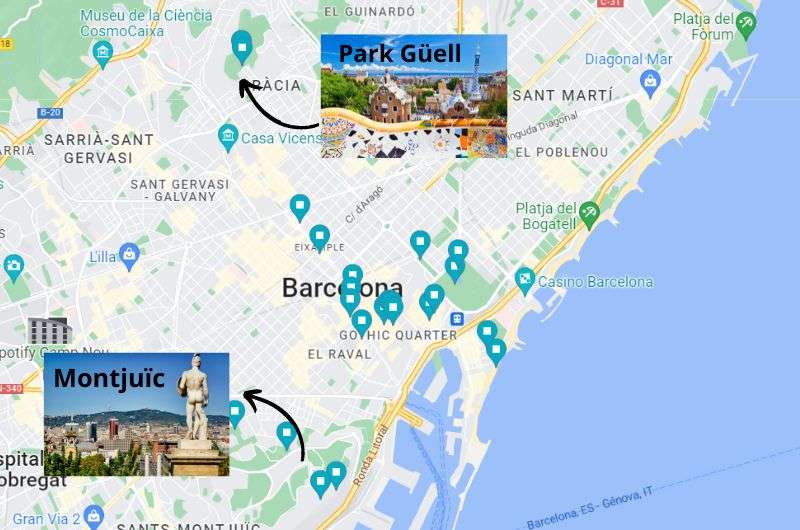
Today, you’ll head outside of the city center
Main sites visited on day 2: Park Güell, Barceloneta Beach, Montjuïc Hill
Restaurant tips: Refresc House | Rias do Miño Restaurant | ABaC Restaurant | Raó Restaurant
Hotel recommendations: Radisson Blu 1882 Hotel
Further reading: A walk through Barcelona |Best restaurants in Spain
Day 2—Barcelona—stop 1: Park Güell
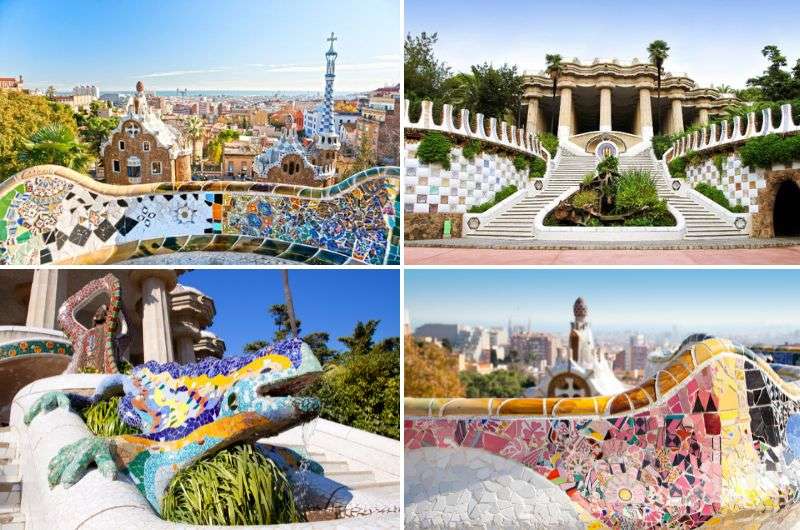
The colorful Park Güell!
Time spent here: 3 hours
Park Güell is a large, hilly, park area filled with stairways, buildings and hidden nooks and crannies, all in Gaudi’s typical style of millions of tiles, colors, melting, and organic shapes.
I used to come here all the time when I worked in Barcelona (this is way back when there was no entry fee, haha). It’s the first of Gaudi’s creations I ever saw, and it mesmerized me.
I recommend getting to Park Güell as early as possible, because the crowds grow as the day goes on. You’ll want to book your ticket in advance with a time slot when you are allowed to enter. Note that the Gaudi House Museum is not part of Park Güell and you’ll need a separate ticket for it, too.
The main area that you’ll be spending time in is protected by UNESCO, and is about 12 hectares. Your ticket will be checked and rechecked in some places. I need to stress that the masses of people will make even the most people-loving visitors cringe, so come prepared.
Given the size of the park, you’ll want to spend at least 2—3 hours exploring. The signage in Park Güell was utterly horrible when I visited. You can just take that as a pass to get lost and see what you find, or, try to fetch yourself a map before you start exploring.
- Park Güell Official Website
- Google Maps link
- Open daily 9:30 am–5:30 pm (that’s the last entry time)
- Tickets are EUR 10 (guided tours are available, too)
Day 2—Barcelona—stop 2: Montjuïc Hill
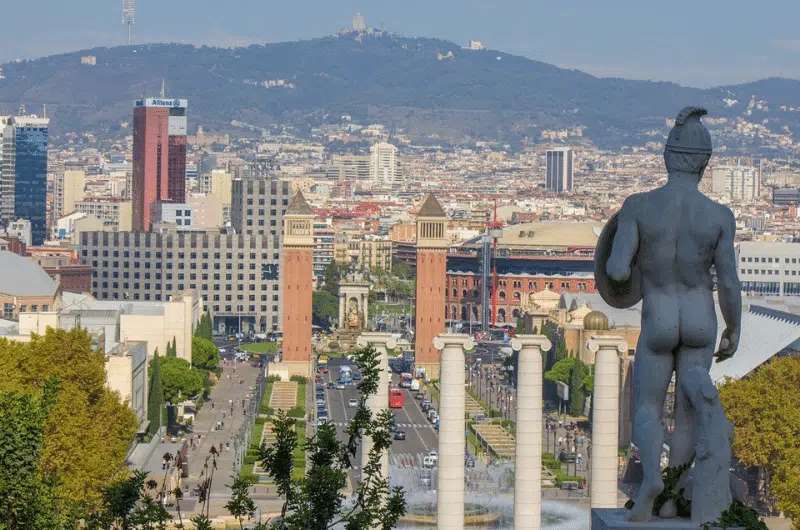
Views of Barcelona from Montjuïc Hill
Time spent here: 3 hours
The next stop on today’s itinerary is Montjuïc Hill, just southwest of the city center.
You could spend half a day here or just hit some of the main spots.
The first would be the Magic Fountain that honestly impressed me a lot more when the kitschy light show wasn’t on during the day, but if you want to Disneyland-esque magic, head out after sunset and take in the colors.
Behind the fountain is the National Museum of Catalan Art, which is an impressive building that reminded me of the Capitol building in Washington DC. Like a brown version of it. I’m not recommending you visit due to time restraints, and the fact that there is a better art museum just up the hill.
That museum is the the Joan Miró Foundation and it’s very much worth a visit if you enjoy modern art. The exhibitions were really nice and the building is as modern as the art it shows.
- Joan Miró Foundation
- Closed Mondays. Other days open 10 am–6 pm
- Tickets cost EUR 14
Generally, there are many gardens and places with nice views, plus a fortress on top. Even though you are heading to Andalusia at the end of this 14-day Spain itinerary, I’d still visit this particular one if only for the superb views of Barcelona.
What I’d do is walk up from the base of the cable car (that takes about 20 mintues) and from there walk to the other cable car in Barcelona. That one will take you to your last stop of the day: the port and beach area.
Day 2—Barcelona—stop 3: Barceloneta Beach
Time spent here: 1.5 hours
I always like ending my day at the beach. The atmosphere of the different music genres playing from the many beach clubs and bars, the sun setting, having a great drink and okayish food—it's what memories are made of.
Barceloneta Beach is a typical city beach, meaning it’s always filled with babes and dudes showing off their tan and is lined with a boardwalk with many restaurants where you can sit and watch said babes and dudes. But it’s not just any city beach, it’s probably my favorite city beach promenade ever. EVER!
Not too shabby as a farewell to Barcelona.
Day 3 of Spain itinerary: Zaragoza, Bilbao
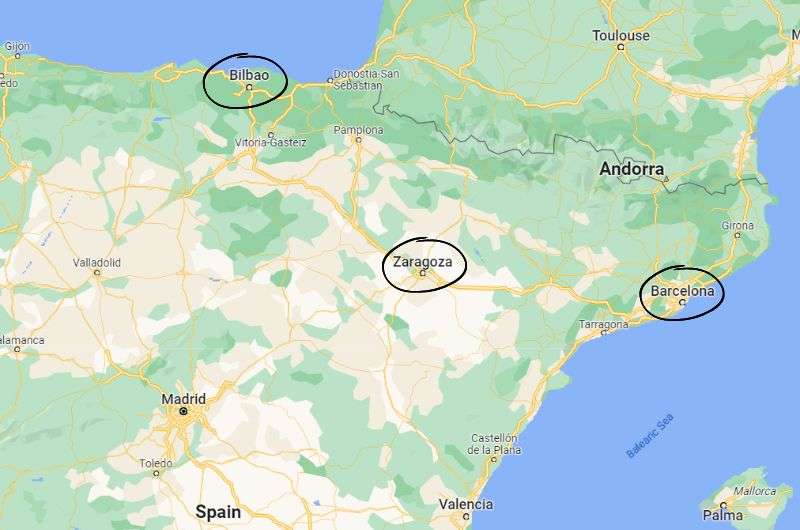
You have a lot of ground to cover today. Take trains or possibly even a plane.
Main sites visited on day 3: Zaragoza: Basilica del Pilar, La Seo Cathedral, Stone Bridge, Origami Museum, Bilbao Old Town
Restaurant tips: La Flor de Lis | Restaurante Tajo Bajo | Cancook Restaurant
Hotel recommendations: Hotel Tayko Bilbao
Further reading: What to see in Zaragoza | Best places in Bilbao
You’ll be moving on to Bilbao today, and Zaragoza will act as a pit stop in the middle. If you’re looking for a place to cut out of this itinerary to save some time, Zaragoza should be first on the chopping block.
The train from Barcelona to Zaragoza takes 1 hour 20 minutes, but from Zaragoza to Bilbao it’s almost 5 hours. Yikes, I know, but you don’t want to skip Bilbao. If this sounds like a big no, look into flights instead (Barcelona to Bilbao obviously).
Day 3, stop 1: Zaragoza
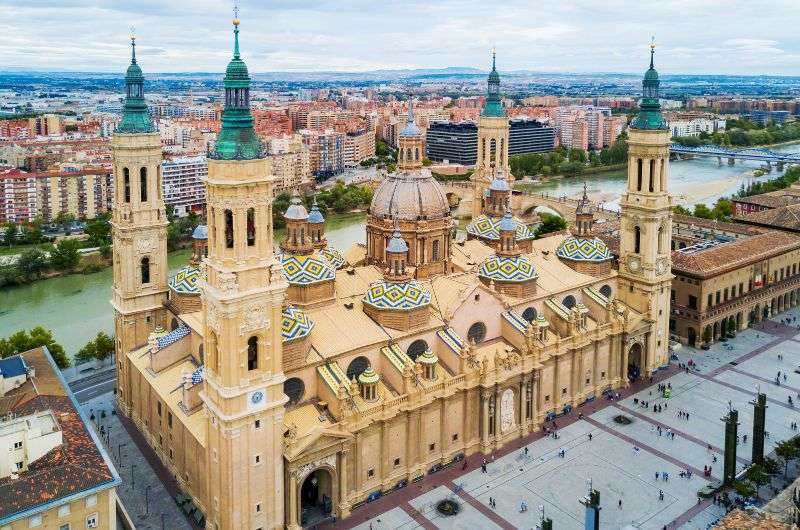
Basilica del Pilar in Zaragoza
Time spent here: 2 hours
I wasn’t very kind to Zaragoza in my article about what there is to see there, but I will say that it’s a solid place to break up a long route and enjoy a little bit of time there.
First, head to the most important religious building in Zaragoza, the Basilica del Pilar. It’s reportedly the first church dedicated to Mary in history and contains a 40 cm (15 inch) wooden Mary statue that is now standing on a jasper pillar in a bronze and silver case in the Holy Chapel of the Pilar.
You can get great views of the Basilica del Pilar from Zaragoza’s Stone Bridge.
Not far from the basilica is the La Seo Cathedral, originally a mosque. Check out the tiles on the façade!
Now this next one isn’t something you’d expect in Spain, but you need to visit Zaragoza’s Origami Museum. It’s random, I know, but guys, this place was really cool! Some of the best international paper-folding peeps exhibit here. So give it the benefit of the doubt and check it out.
If you just can’t wait to visit something Moorish before you get to Andalusia, Zaragoza does have something to satisfy your cravings: the Aljafería Palace. It is considered one of the most important Islamic monuments in Spain.
See the details about all of Zaragoza’s places to visit in this article.
Day 3, stop 2: Bilbao
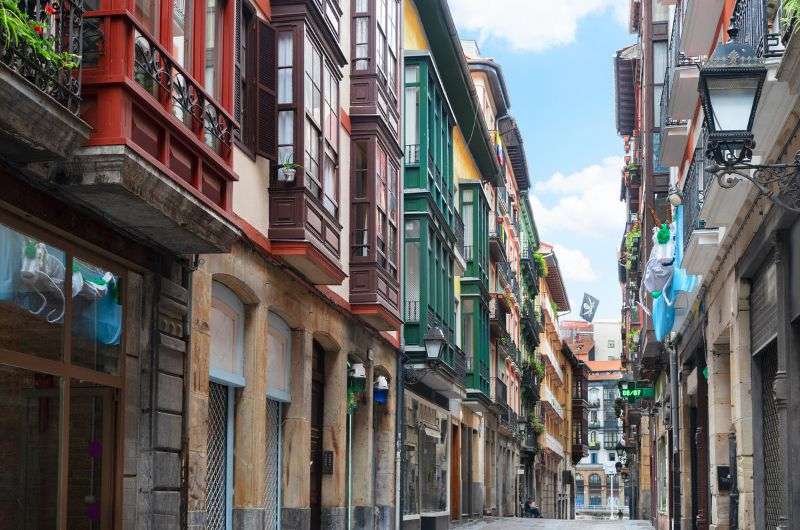
Streets of Bilbao
You’ll need to be done with Zaragoza in a couple of hours if you want to make it to Bilbao by train today. It’s a long, almost 5-hour train ride to get there!
Bilbao is in Basque country, which might as well be a country of its own (like the language?! You won’t be able to read anything at all.). The city is uber cool and you’ll love it without being able to put your finger on why exactly.
Once you get to Bilbao, you’ll be just about tired out for the day, so you’ll leave the bulk of your sightseeing for tomorrow. Check in to your hotel, Tayko Bilbao, which is perfect location-wise and for the simple fact that there’s a Michelin restaurant waiting for you there. You’ll be well taken care of at Tayko!
If you are able to pry yourself away from the hotel, you’re right in the middle of Old Town, so you can easily head out for a stroll.
On your way through the little streets towards the Santiago Cathedral, stop for a 5-second look at the Fountain of Dogs (Txakurraren iturria—this is not a typo, it’s proof that you are deep in Basque country).
If you haven’t had dinner yet, stop by Gure Toki on the corner of Plaza Neuva. You can either stay on the large square for the rest of the evening, or start walking back to the riverside, which is where Tayko Hotel is located.
Your hotel in Bilbao
I’ve already talked about Tayko’s Michelin restaurant, but that’s not to say the rooms are any less spectacular. The design at Tayko Bilbao is minimalist, black & white. The whole place feels a little smug. They’re as cool as Bilbao, what can I say.
Try to get a room overlooking the river to make your stay in Bilbao extra nice.
Day 4 of Spain itinerary: Bilbao
Save all the places on this itinerary for Spain in Google Maps
Main sites visited on day 4: Guggenheim Museum, Mount Artxanda, Central Bilbao, Maritime Museum
Restaurant tips: Islares Restaurant | Mugarra
Hotel recommendations: Hotel Tayko Bilbao
Further reading: What to see in Zaragoza | Best places in Bilbao
Day 4—Bilbao—stop 1: Guggenheim Museum
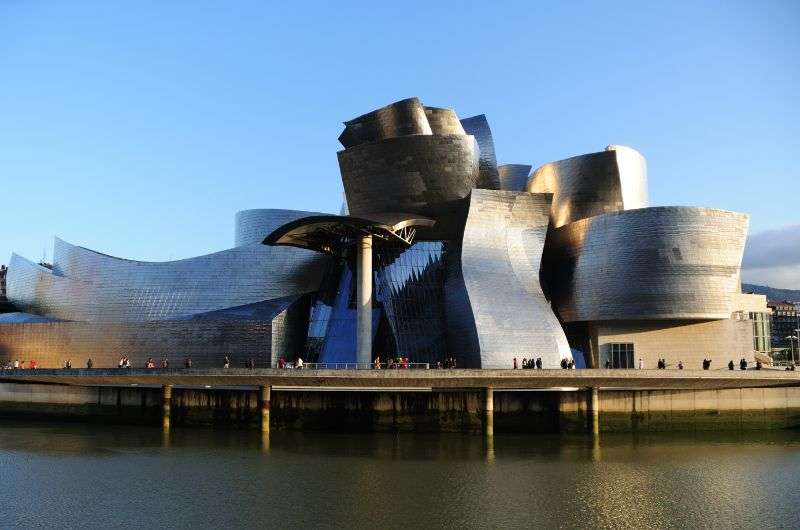
Guggenheim Museum
Time spent here: 3 hours
Your main stop of the day is the famous Guggenheim Museum. It looks either like a shoe or an alien space ship, depending on how your mind works. It’s shiny from the outside and full on contemporary art on the inside. Or actually, there’s a big flowery dog and a huge spider mom on the outside, too (to name a couple), so you’ll start enhancing your brain function right from the get-go. At least they say that that’s what art does.
The museum is built around an atrium in the middle that is connected to the three floors by curved walkways and glass elevators.
There’s a lot to see in the Guggenheim Museum, and you could spend up to 4 hours there if you are fascinated by most of the exhibits. But even common folk will want at least 2 hours to walk through.
If you need a break, there’s a café on site.
- Open Tuesday to Sunday 11 am–7 pm. Mondays are closed unless visiting in July and August.
- Tickets cost EUR 13 and can be bought online (you get a time slot)
Day 4—Bilbao—stop 2: Mount Artxanda
Time spent here: 1 hour including cable car
You may want to stop for lunch at Islares Restaurant or Mugarra before heading to your next stop. Just make sure to make reservations, especially at Islares. They need your name so they can personalize your menu for you!
Cross the Zubizuri Bridge before you line up for the cable car for a little trip up Mount Artxanda. It’s great to have a hilltop viewpoint above any city, and Bilbao is no exception, complete with a big, red Bilbao sign at the top. You’ll also find a few art installations there. The cable car costs EUR 4.50 for a return ticket and leaves every 15 minutes.
Day 4—Bilbao—stop 3: Central Bilbao
Time spent here: 2 hours
Once down from the mountain, you can take a stroll through central Bilbao, stopping for a coffee or three along the way.
There are a couple of (big) buildings of interest that you can use as stopping points.
One of those is Azkuna Zentroa Cultural Center, in what used to be an old wine, oil and pickle warehouse. The building is huge and arguably the best part, even though there is always an event, exhibition, concert or conference happening. Wandering around the public spaces with various art installations is all you need to get a feel for it, though.
You can look around the atrium to find about 40 stubby, weird columns. Each one is different, an art piece in itself. Don’t forget to look up and see people swimming in the swimming pool above through its glass bottom! You can also browse the design store, visit a movie theater and enjoy a couple of nicely designed restaurants.
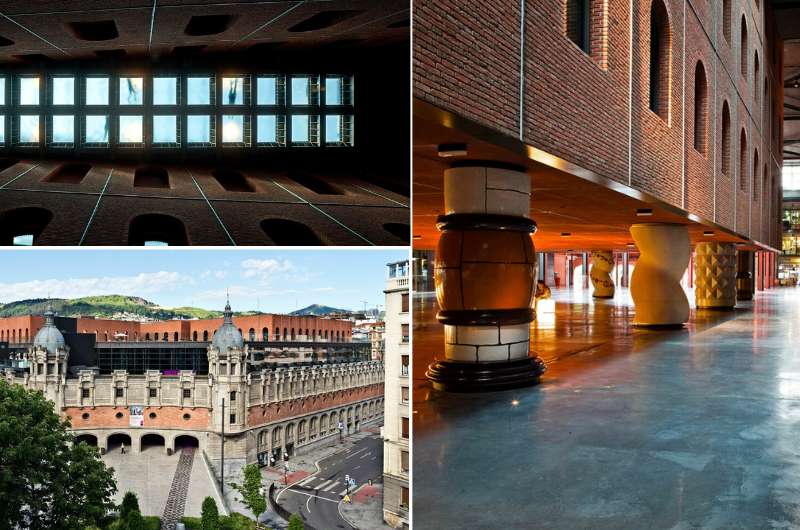
Azkuna Zentroa Cultural Center. The pool is very cool, you have to admit!
The other building is the famous San Mamés Football Stadium (that’s soccer for you American linguists). Replacing the old Sam Mamés that was first nicknamed “The Cathedral” due to its importance in the soccer world, the new stadium is now one of Bilbao’s architectural highlights.
The stadium is home to Athletics Bilbao, one of Spain’s most successful soccer clubs. You can take a guided tour of the stadium (45 minutes) or see the Athletic Club museum if you are into people chasing balls.
Day 4—Bilbao—stop 4: Maritime Museum
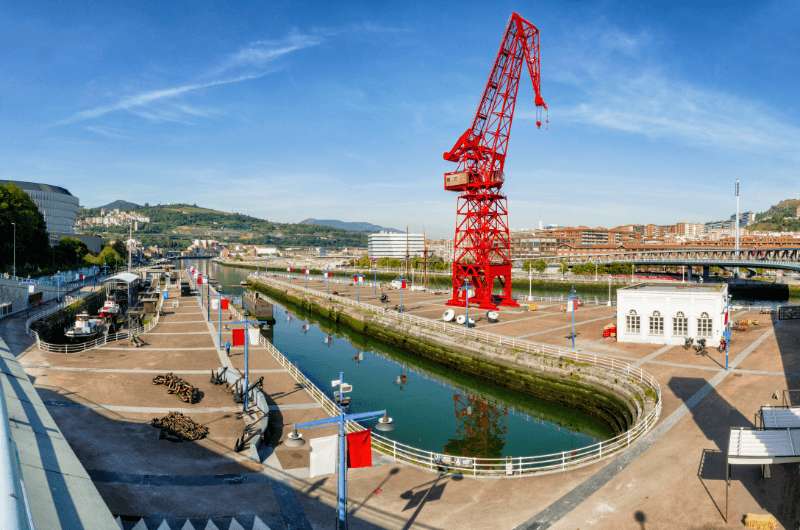
There she is! Carola the Crane
Time spent here: 1.5 hours
Given Bilbao’s maritime importance, it would make sense to educate yourselves a little on the subject.
Located in an old shipyard, the Itsas Maritime Museum is interesting not only for boat nerds. The displays are interactive and fun to look at even if you don’t want to read all the details. Outside, you can walk around the renovated area that used to be a shipyard.
Look out for “Carola”, the red crane named after a beautiful lady that used to pass through on her way to work every day. It was built in 1957 and was the strongest crane in its day.
- Itsas Museum official website
- Google Maps link
- Open Tuesday to Sunday 11 am–7 pm
- Tickets cost EUR 6
More details on all of the places mentioned here are in my Bilbao guide.
Day 5 of Spain itinerary: Getting to Madrid
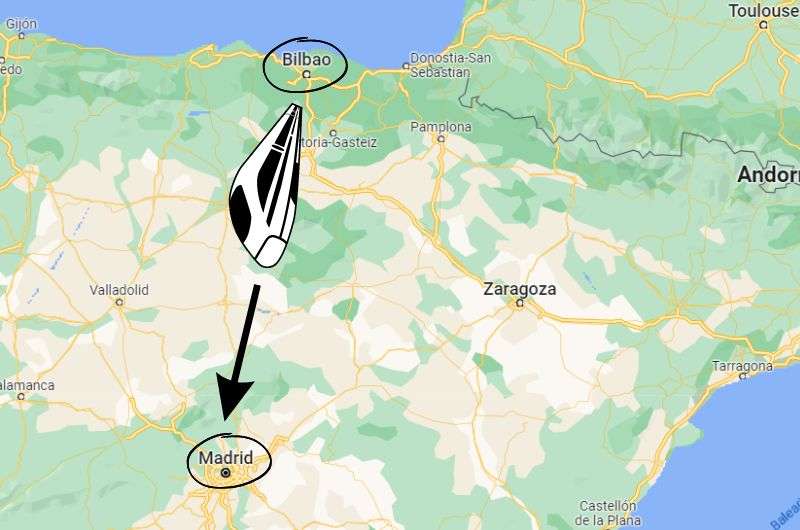
Train time!
Main sites visited on day 5: Plaza Mayor, Puerta del Sol, El Oso y el Madroño, Plaza de Callao
Restaurant tips: Honest Greens Gran Via 7 | Empanadas Las Muns | La Perejila
Hotel recommendations: Hard Rock Hotel
Further reading: Best museums in Spain | Spain background | Nightlife in Spain
Day 5, stop 1: Train to Madrid
Spain’s capital, Madrid, is a 5-hour train ride from Bilbao—the perfect time to catch your followers up on how amazing your vacation is, right? For me, it’s the perfect time to read a book. Getting old I guess.
Unlike most other cities on this Spain itinerary, Madrid feels the most real and least touristy. You can tell it’s a working capital, not a tourist destination that comes to a halt when the tourist flocks leave.
It’s also party central, so if you like to bar hop, you’ll find many options just waiting to be your host for the evening. More on that later.
Once you get into the city, get rid of your stuff at your hotel. You know I have a recommendation for you, and I didn’t make the decision lightly.
Hotel in Madrid
Hard Rock Hotel is as cool as it sounds and the location is perfect.
There’s an amazing entertainment system in all the rooms and you can get some of the best views in Madrid from one of the hotel’s bars. To top it off, staff is lovely.
You can also do what I do and visit Hard Rock Cafes all over the world and add their pins to your collection. They always say the name of the place they’re from, so it’s a fun little collector’s item/souvenir.
Day 5, stop 2: Madrid city center and nightlife
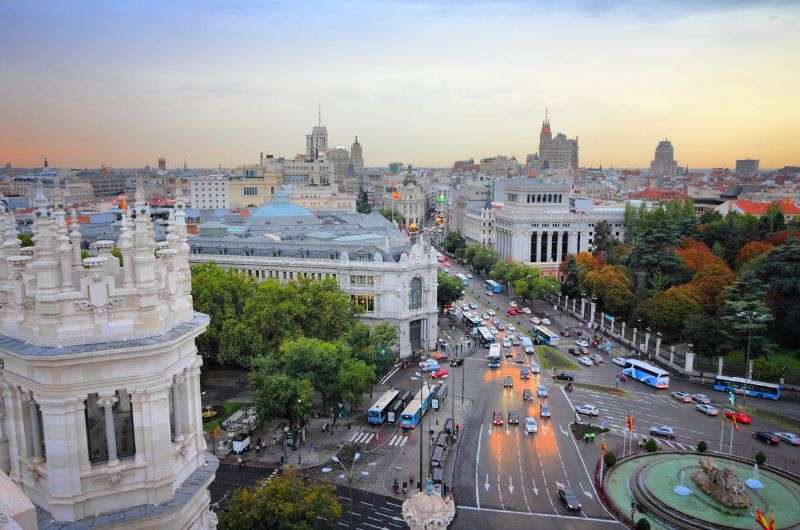
Madrid city
Once you’re in town, wander the city center. Stay around the stately Plaza Mayor and in the streets towards Puerta del Sol, another large square with a statue of a bear trying to climb a strawberry tree. Surprise, it’s the official statue of Madrid, “El Oso y el Madroño”!
After that, stay heading north to Plaza de Callao, which will remind you of NYC’s Time Square.
If you're getting hungry, head to Calle de la Cava Baja, which is a lively street full of tapas places and cafes. But this is Spain, where evenings only start at 8 pm, so don’t try to come here any sooner. It will be dead. Read more about the specifics of Spanish nightlife.
If it’s getting really late, remember that Madrid’s nights aren’t meant for sleeping. No matter what your taste in music, there’s a venue out there for you. And if not, remember that your hotel, the Hard Rock Hotel, has it’s own incredible bars.
The Fuencarral and Huertas districts are some of the liveliest, while Salamanca is where you’ll find some of the more upscale places. Remember the bars and clubs in Madrid often don’t open until after midnight, so you’ll be the lamest person there if you get there before 1 am.
See, I told you you should just hang out at your hotel! Ain’t nobody got time for beers until dawn! What are you, 21?
Day 6 of Spain itinerary: Madrid’s Prado and Royal Palace
See all of the places on this itinerary on my Google Maps list. My list can be your list.
Main sites visited on day 6: Prado Museum, Retiro Park, Royal Palace
Restaurant tips: Restaurante Adrede | The Spanish Farm | La Perejila
Hotel recommendations: Hard Rock Hotel
Further reading: Best museums in Spain | Spain background | Nightlife in Spain
Day 6—Madrid—stop 1: Prado Museum in Madrid
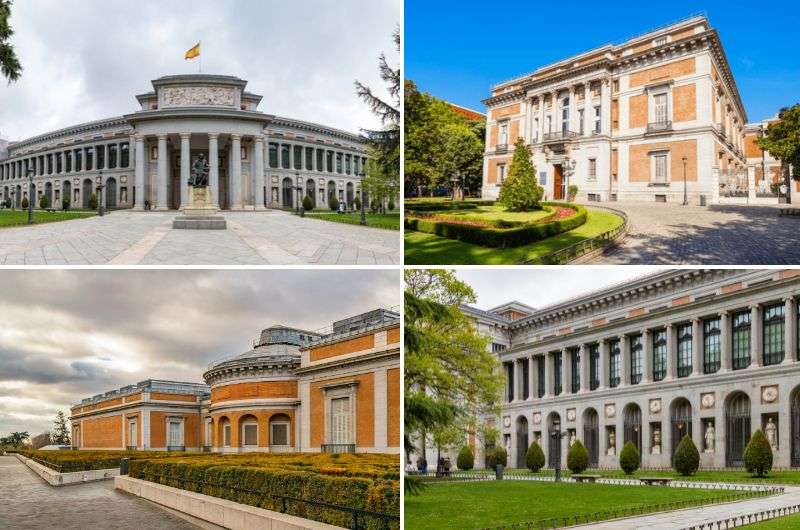
The Prado Museum is huge!
Time spent here: 1–3 hours
The Prado is the top museum in Madrid and possibly all of Spain, and it’s massive. Like you’ll- need-a-good-map kind of massive. It’s Spain’s national art museum, but you don’t need to be an art freak to enjoy it.
Really—the brochure you get at the entrance has three routes to choose from based on how long you want to wander through the many (many!) rooms: 1 hour, 2 hours, and 3 hours. Seems more doable now, right?
The Prado displays the art of many great artists in over 120 galleries. There is a café on site if you need a break.
If you buy a ticket online, you can skip the line at the ticket counter.
More info in my best museums in Spain article.
- Google Maps link
- Open Monday to Saturday 10 am–8 pm, Sundays and holidays 10 am–7 pm
- Tickets cost EUR 15. Free during the last two hours of every day, or extra expensive 1 hour before opening time for a private sesh.
Day 6—Madrid—stop 2: Retiro Park
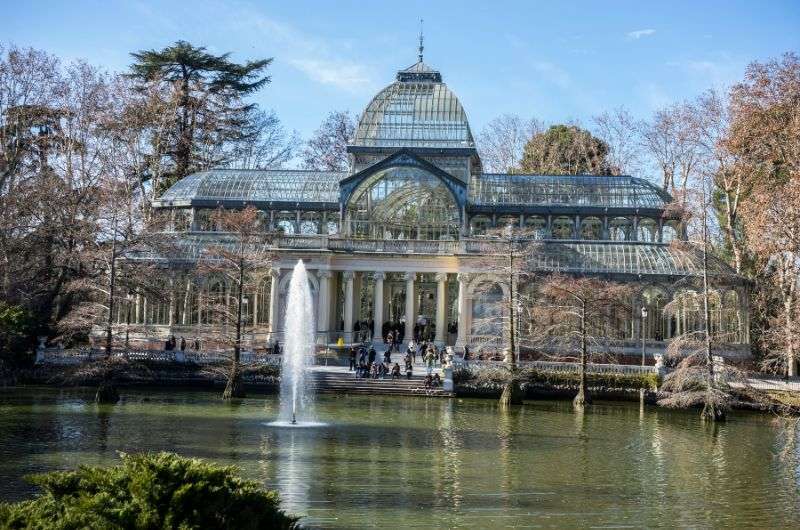
Retiro Park
Time spent here: 1–2 hours
You have seen art. You will now see nature.
Why not do it like the kings used to in Retiro Park. The park belonged to Spanish royalty until a little over 100 years ago when it was turned into a public area, and it’s where all the blue-blooded folk used to gather and get their R&R. What did you think I meant, you dirty bastard!?
In 2021, the park became part of UNESCO, so it’s a special place not only because I say it, but the big fellas think so, too.
You’ll be fascinated by the glass Palacio de Cristal that now serves as an art exhibition hall, or you can ogle the similarly impressive monument backing the Great Pond (all while feeding the great ducks!).
Day 6—Madrid—stop 3: Royal Palace of Madrid
Almost directly across from the Prado is the Royal Palace of Madrid. Just walk straight for 30 minutes until you bump into this:
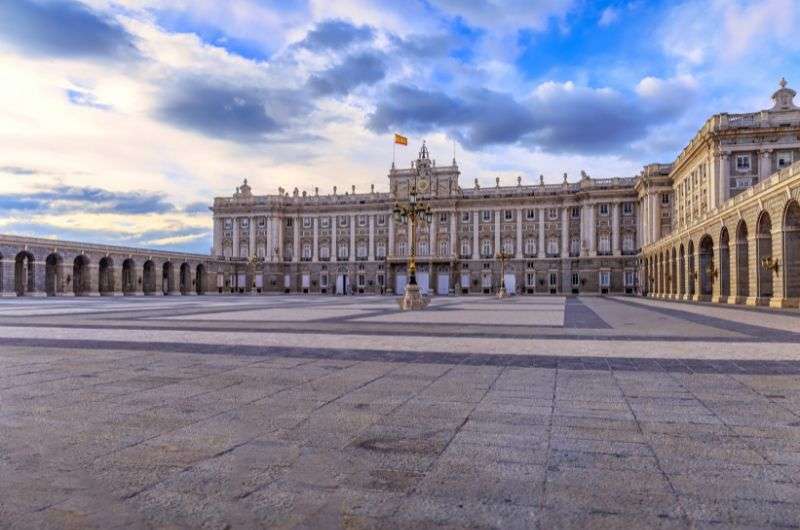
Royal Palace of Madrid
Time spent here: 2 hours
You’ve seen where they used to have picnics, now you’ll see how they lived and worked. The current royal family chose the Palacio de la Zarzuela up in northern Madrid as their base, so don’t be expecting to run into Felipe VI at the Royal Palace (Palacio Real) unless there’s an official state ceremony taking place.
Imagine cleaning or even just keeping track of 3,418 rooms—that’s how many there are in Madrid’s Royal Palace, making it the largest in Western Europe. You could argue with your spouse, storm off, and then never see them again!
You can’t visit all of the rooms, but places like the armory and the throne room are waiting just for you (and the other 2 million visitors per year). The royal dressing room is absolutely over the top, but I think the most interesting bit was the kitchen!
Note that if you’re visiting during the free hours (Monday to Thursday from 4 pm to 6 pm), you aren’t allowed in the kitchen. It’s worth paying for guys.
You can go on a self-guided tour, but I’d get the audio guide if you do. They also have human guides if you prefer those.
Don’t forget to take a look at Catedral de la Almudena while you’re at the Palace.
- Royal Palace of Madrid official website
- Google Maps link
- Open daily 10 am–5 pm, Sundays just until 4 pm (last access is 1 hour before closing time)
- Tickets cost EUR 12 + EUR 5 for the audio guide
Day 7 of Spain itinerary: Cordoba, Sevilla
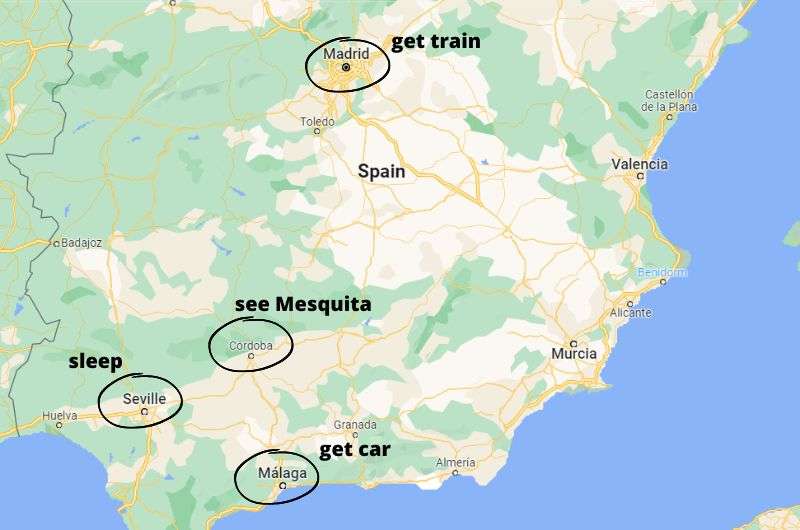
Today is the day you travel too much
Main sites visited on day 7: Cordoba: Mesquita, Jewish Quarter, Roman Bridge. Sevilla: Plaza de España
Restaurant tips: Mercado Victoria | Casa Pepe de La Judería | Restaurante Montevideo Steak House
Hotel recommendations:
Further reading: What to see in Cordoba | Sevilla’s best places | Andalusia in a nutshell
It’s time to skip over a big chunk of the country to the most interesting, colorful and lively part of Spain—Andalusia! The southernmost region is also the region with the densest places of interest. The people of Andalusia will make you feel like you’re part of the family faster than you can say free tapas.
Tip: I have a separate 10-day Andalusia itinerary, too. It focuses just on southern Spain and ignores the rest of the country. Maybe it’s something to consider doing if all this driving makes you want to scream just reading about it.
Today you’re in for a lot of travel time, but that’s what you get when you try to fit in an entire country into a 2-week itinerary. If you’re getting your car in Malaga, it’s a 2.5-hour train ride from Madrid to Malaga, pick up your car, and then book it a further 1.5 hours to Cordoba, followed by another 1.5 hours to Sevilla in the evening. Buckle up!
Day 7—Cordoba—stop 1: Mosque Cathedral
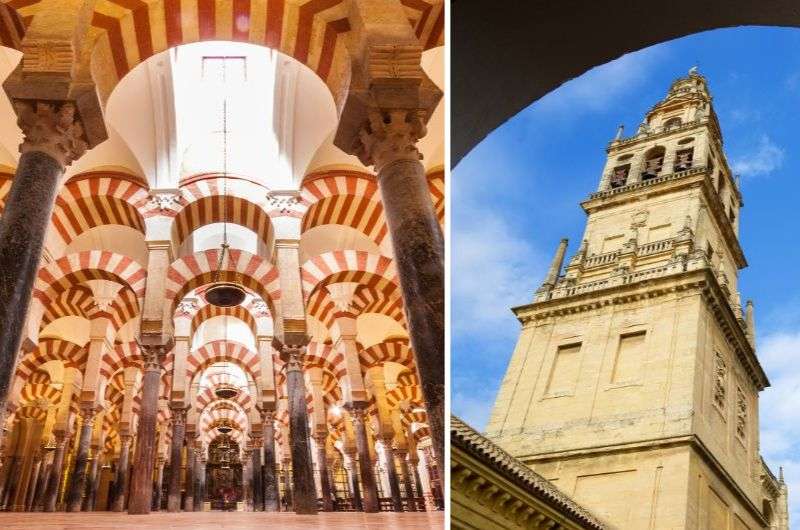
The Mosque Cathedral interior and the Bell Tower
Time spent here: 1 hour
Called mezquita for short, the mosque was first built in the 8th century by the Muslim rulers of the time and was the second-largest mosque of its day. After the Christian reconquest in the 13th century, the mosque was converted into a cathedral with almost no alterations. They threw out the Quran, added a Bible and called it a day.
As for the minaret, they chucked the muezzin and added a bell to make a church tower. Work smarter, not harder, right?
It wasn’t until 300 years later that they added the nave and transept, merging two completely different sacral buildings into one. The original mosque part is low ceilings, lots of columns and red and white stripes. The church part is very much a church that happened to land in the middle of a mosque. It’s wild to see that this is what they came up with.
You can visit the Mezquita and the bell tower separately. For me, the bell tower was the absolute top thing to see, while the Mesquita itself was slightly underwhelming. Maybe it’s because it doesn’t look very interesting from the outside.
Tickets can be bought on site or online. For the bell tower, since you go in as part of a group at a certain time, we recommend booking your time slot beforehand. For the Mezquita, it’s easy to just show up and buy a ticket on the spot.
- Google Maps link
- Mezquita: Monday to Friday 10am—2pm and 4pm—6pm. Saturday 10am—6pm. Sunday 8:30am—11:30am and 4pm—6pm. Times may vary in different parts of the year.
- Bell Tower: Monday to Saturday: 9:30am—5:30pm. Sunday 9:30am—11am and 12pm—5:30pm. Entrance every 30 minutes. Times may vary in different parts of the year.
- Tickets are EUR 11 for the Mezquita and EUR 3 for the bell tower
Day 7—Cordoba—stop 2: The bridge and the Jewish Quarter
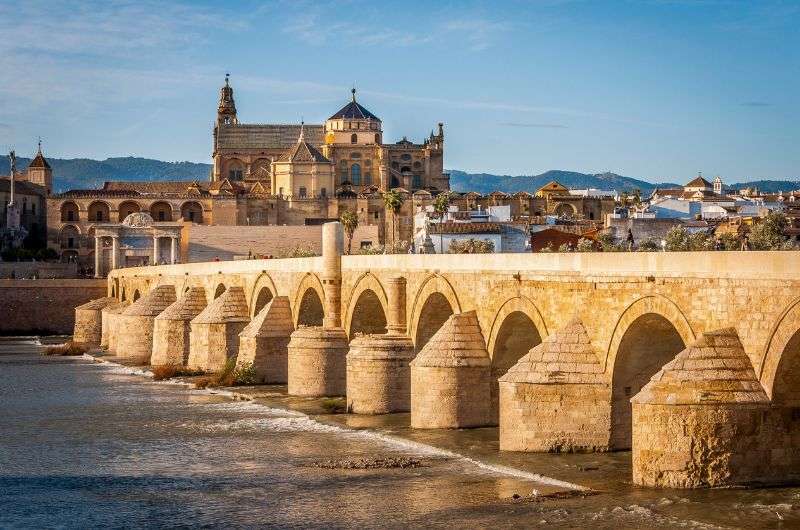
The Roman Bridge infront of the Mesquita
Time spent here: 1.5 hours
Continue your half-day in Cordoba by wandering the narrow streets of the Old Town and the Jewish Quarter (Judería) —the area around the Mosque Cathedral.
While you’re walking around, notice the many small courtyards (patios) that Cordoba is also famous for. If you’re in town in the first half of May, you’ll be able to take part in the annual Festival of the Patios, which is when Cordoba is tearing at the seams with way too many visitors.
One of the notable streets in the Old Town is Calleja de las Flores, which not only has little nooks and patios, but also an abundance of flower decorating just about every square cm.
The synagogue is free to visit, though it’s only one small room and will take you about 30 seconds to see.
In front of the Mesquita is the Roman Bridge, an old stone bridge that gives you nice views to the city (especially from the opposite shore so the bridge is in your photos, too).
If you are enchanted by Cordoba and want to see more of its highlights, read my Cordoba guide. But I’m afraid you won’t have much more time on this Spain itinerary for 14 days. You’d have to leave out other bits if you want an extension in Cordoba or elsewhere.
Day 7—Sevilla—stop 3: Your hotel
After you’re done in Cordoba, force yourself back into the car and drive to Sevilla (1.5 hours max). Actually, if you’re visiting in hotter months, you might welcome the AC, because holy guacamole is Andalusia HOT!
Go and check into your hotel so you can wash away the sweat. Which hotel? This one:
Your hotel in Sevilla
Check out the 4-star Melia Sevilla, which is right by Plaza de España. Conveniently enough, that’s where you’ll be ending your day today, and you know you want that—no more moving around, please!
Melia Sevilla pulls out all the stops without being insultingly expensive. It’s got a trendy design and lots of natural light, an outdoor pool, a spa with hamam… in case you feel really dirty.
You can ask for a room with a balcony facing the Plaza de España, or, if you do want to make your stay insultingly expensive, there is “The Level”, where you high ballers can congregate amongst yourselves.
Last but not least, the breakfast is superb. For all levels.
Day 7—Sevilla—stop 4: Plaza de España
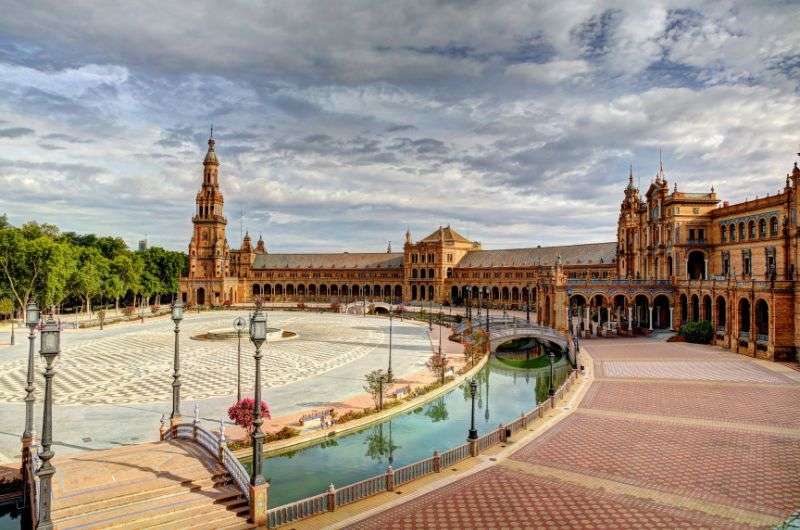
Plaza de España
Time spent here: as long as you have energy for
End your day at the incredible Plaza de España and the Parque de María Luisa.
The Plaza de España was the central, half-circle Andalusia pavilion and main focal point of the 1929 Ibero-American Exposition. Now it’s just there to wow you and to provide offices for the government. But you’re here for the wowing, obviously.
Around the plaza there are tiled alcoves, each of which represents a different region in Spain, a canal where you can rent row boats, a fountain and several other buildings that served as Spain expositions.
For me, it’s one of the most monumental places in all of Spain... but it’s still worth only about 30 minutes of your time to really see it.
There are frequent shows around the plaza. When we visited, there was a flamenco dancer stomping on the 2nd floor of Plaza building, so just roam around and see what you can find. It’s a really pretty place.
Extra points if you catch a sunset at Plaza de España.
Day 8 of Spain itinerary: Sevilla
Your route for day 8 of Spain itinerary 14 days on Google Maps
Main sites visited on day 8: Sevilla Palace (Alcazar), Barrio Santa Cruz, Cathedral, La Giralda Bell Tower, Ceramics Center, The Mushrooms
Restaurant tips: is El Librero Tapas y Quesos | La Brunilda | Vineria San Telmo
Hotel recommendations: Melia Sevilla
Further reading: Best Places in Sevilla | Best Museums in Spain
Today you’ll explore more of Sevilla, which is probably my favorite city in Spain right after Barcelona. It’s just... awesome!
Day 8—Sevilla—stop 1: The Royal Alcazar of Sevilla
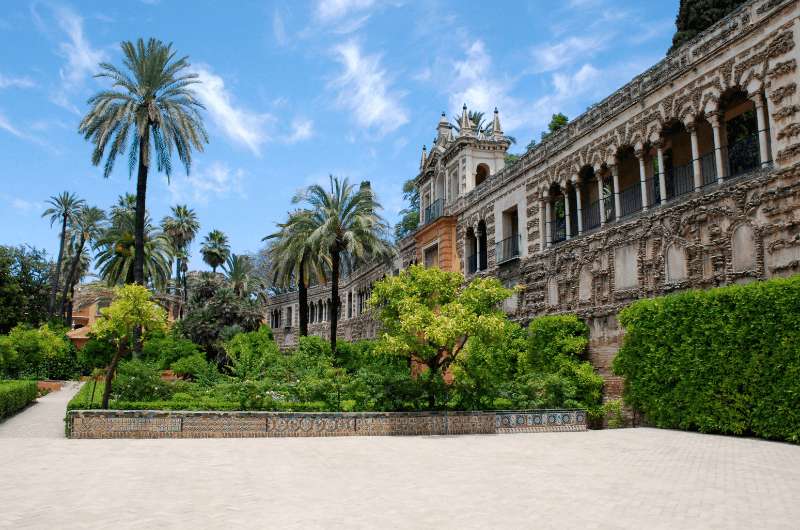
Gardens of the Alcazar
Time spent here: 3 hours minimum
Sevilla’s Alcazar (palace) and its gardens are my favorite in Andalusia. That’s saying a lot, because the palaces are all pretty fantastic. If you add the immaculate gardens (you have to), you are looking at least 3 hours of exploring. There’s really so much to look at, so make sure you leave yourself enough time to see it.
The Alcazar is the oldest royal palace still in use in Europe today. When the Spanish royal family is in Sevilla, it resides in the upper stories of the palace. When they’re not there, you, too, can visit their apartments! No really, you can even go to the bedroom.
The Courtyard of the Maidens, the Princess Baths, the Ambassador’s Hall… each area leaves you thinking it can’t get any better, but then it does! The architecture is the most interesting part; the exhibitions... less so.
Details about visting the Alcazar are in my full Sevilla article.
- Open daily 9:30am—5pm, or until 7pm in April—October. Nighttime visits available.
- Tickets cost EUR 13.50 for general entry, EUR 5.50 extra for royal bedroom
Day 8—Sevilla—stop 2: Jewish Quarter
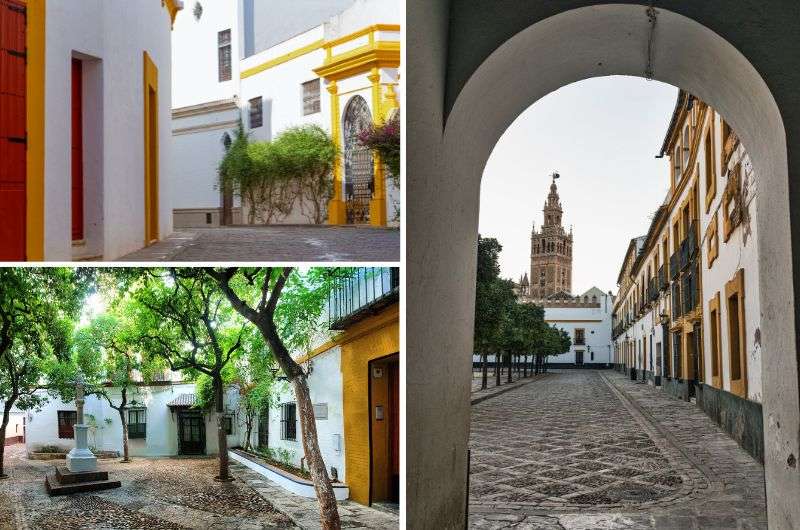
Barrio Santa Cruz
Time spent here: 1 hour
The neighborhood between the Alcazar and Sevilla’s Cathedral is called Barrio Santa Cruz, the old Jewish quarter. This is where you want to wander aimlessly in the narrow alleys, passing tapas bars, tiled benches and myriads of orange trees.
This is also an area where you’ll find the most tourists, which also means a lot of tourist traps, shitty restaurants and stupid souvenirs.
Restaurant tip: One great tapas restaurant that won’t disappoint is El Librero Tapas y Quesos.
Day 8—Sevilla—stop 3: Sevilla Cathedral and La Giralda Bell Tower
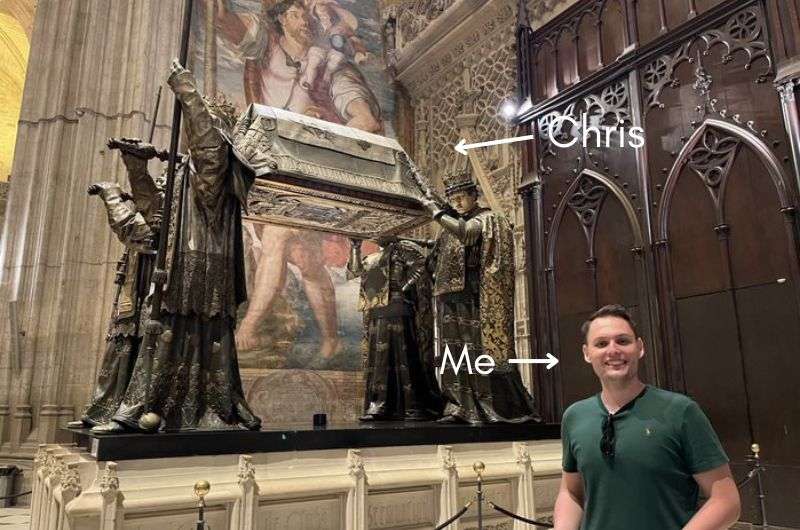
Me and Chris
Time spent here: 1.5 hours
The cathedral in Sevilla is currently the largest gothic church in the world, and it’s also the 2nd or 3rd largest cathedral and 3rd or 4th largest church in the world. I try to explain the vocabulary and details in my Sevilla article.
Sevilla’s cathedral was built on the site of a mosque (are you starting to see a pattern here?). The former minaret, again, became the famous bell tower, La Giralda.
It is HUGE and spectacular, and you really want to get a good like inside. There are no less than 80 chapels, each of them looking like you could fit another church in there.
Aside from the regular church stuff inside, you’ll also notice a famous man’s resting place: none other than Christopher Columbus himself. Then, climb the bell tower to take a good look at Sevilla from a bird’s eye view.
You can buy tickets buy tickets online or at the door for a slight surcharge, but you risk them being sold out.
- Sevilla Cathedral official website
- Google Maps link (online ticket holders enter through La Giradla gate, to buy tickets on the spot, go to the main gate)
- Open daily, Monday—Saturday 10 am—6 pm, Sundays 2:30 pm—7 pm (last entrance 1 hour before closing time)
- Tickets are EUR 11, audio guides are EUR 5 extra. Guided tours are available for EUR 20. Get your tickets online.
Day 8—Sevilla—stop 3: Ceramics Center
Time spent here: 1 hour
Andalusia is tile central. There are tiles in palaces, on park benches, on restaurant tables… so it’s only fitting to visit a ceramics museum. The museum itself is in a former ceramics factory, since Triana is the part of Sevilla that traditionally produced the most tiles and ceramics. Even the tiles on the fabulous Plaza de España are from here!
Centro Cerámico Triana is located in the less touristy part of Sevilla called Triana. It’s is a vibrant, artsy place with many shops and restaurants right across the river from the Old Town.
You can extend your tile tour in the streets surrounding the museum where there are many ceramics shops. You’ll want to get your entire family tiles as souvenirs, I promise.
- Centro Cerámico Triana
- Google Maps link
- Open Tuesday to Saturday 11 am–6 pm. Sundays 10 am–3 pm. Closed on Mondays.
- Tickets cost EUR 2.10
Day 8—Sevilla—stop 3: Sunset at Sevilla’s Mushrooms
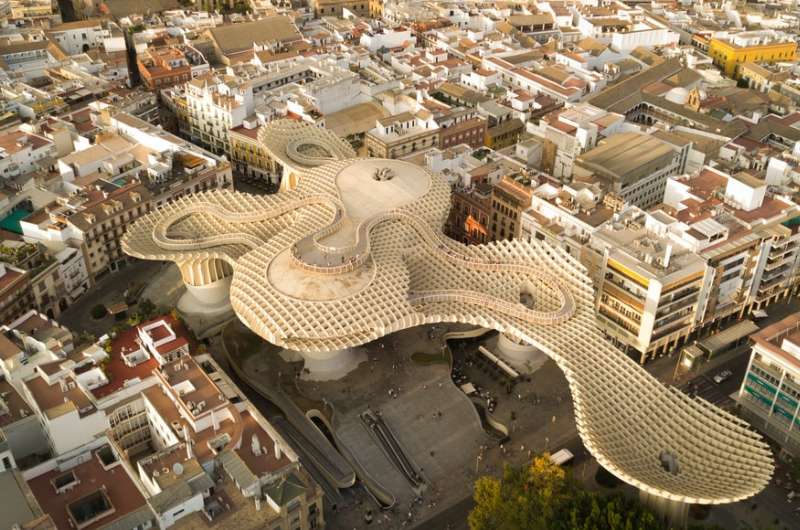
“The Mushrooms”
Time spent here: 1 hour to as long as you desire
Finally, walk to the northern part of Old Town to the largest wooden structure in the world—“The Mushrooms” (Las Setas). It’s is a controversial group of 6 giant mushroom-looking things with a total of 5 floors (there’s an elevator).
Visit the light show, but make sure to be there either at sunset or after to appreciate the colors gliding across the top. Just a note that you’ll have to ignore the shady underbelly to really consider this place beautiful.
A unique view of the Cathedral can be seen from it, too.
If you get your tickets online to choose your preferred time slot.
- Setas Sevilla official website
- Google Maps link
- Open daily 9:30 am–12 am
- Tickets cost EUR 15. Buy them online.
Day 9 of Spain itinerary: Ronda
See all the places from day 9 of Spain itinerary on Google Maps
Main sites visited on day 9: New Bridge, bridge viewpoints, Old Town, Arab baths, bullfighting arena, Paseo de Blas Infant
Restaurant tips: Restaurante Las Tablas | El Lechuguita | BlackCoffee
Hotel recommendations: Hacienda Fresneda María by Charming Stay
Further reading: Best Spots in Ronda | Andalusia in a Nutshell | Bullfighting in Spain
Today is the last time you change hotels on this Spain itinerary! Can I get a “weeehaaaw!”? You’ll stop by Ronda on your way to the best hotel I’ve stayed at in all of Spain, Hacienda Fresneda María.
Ronda is a tiny town perched up on a limestone rock formation made famous by a spectacular bridge over the gorge in the middle of it. The drive from Sevilla to Ronda will take you 1 hour 45 minutes.
Your hotel in Andalusia:
I can’t wait to tell you about this hotel I stayed at: Hacienda Fresneda María by Charming Stay is wonderfully secluded and extremely private with amazing views of the mountains and olive trees all around. Located pretty much in the middle of all of Andalusia’s best places, the drive to Malaga is about 45 minutes.
The interior design elements are modern, combining wood with whites and browns, calming your soul, however hippie dippie that sounds. The huge windows and balconies give glimpses of the scenery, adding to the fabulous rest the comfortable beds give you.
And you won’t be sad to be further away from Spain’s best restaurants, either, since Hacienda Fresneda María’s own restaurant is Michelin-level in both food and service.
Need I say more? I loved it there.
Day 9—Ronda—stop 1: New Bridge and viewpoints
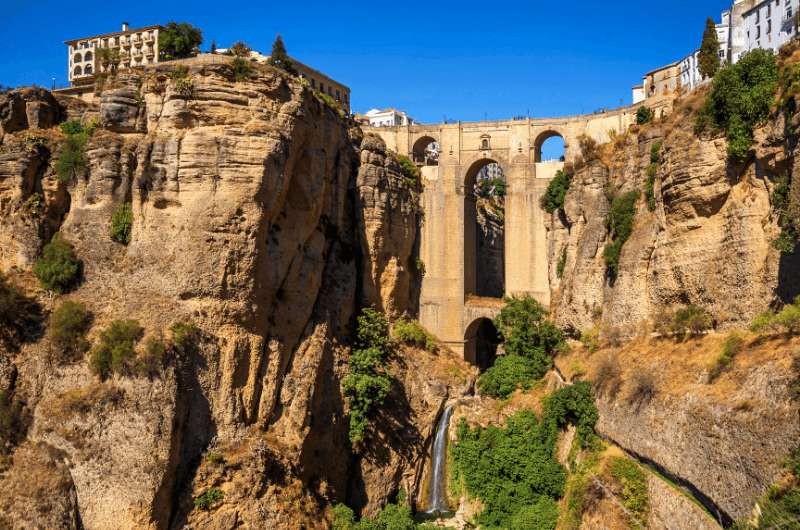
View of New Bridge in Ronda from a viewpoint in the gorge
Time spent here: 2 hours for the bridge and to hit all the viewpoints
Even though you’re probably dying to get to the hotel right now, first make a stop at Ronda. It’s a Spain itinerary, so you should see Spain, not just the great hotels I found for you! But I get that it’s tempting, especially after 8 days of traveling.
Park at one of the many parking lots in Ronda, we found this parking lot good (and cheap for about EUR 1 per hour).
And since Ronda is all about the views (and not much else), head straight to the New Bridge (Puente Nuevo). It’s the highlight of the town and is worth braving the crowds that flock here.
After the bridge you’ll spend the rest of your time in Ronda chasing viewpoints. First, make a stop at Mirador de Aldehuela, which is right behind the bridge. Behold, the back of the bridge! Then, go to the viewpoint called Mirador de María Auxiliadora. There’s a path into the gorge from there. Follow it to the end for the best shot of Ronda and her bridge.
You’ll also naturally start wandering through Ronda’s Old Town streets, like the main thoroughfare, Calle Armiñán, and hit the main church, Iglesia de Santa María la Mayor (Guess what? It used to be a mosque!).
Day 9, stop 2: Arab Baths
Time spent here: 30 minutes
Ronda’s Arab Baths are some of the best preserved baths of this type in all of Andalusia. They were built in the 13th century and used by Muslims and visitors alike to purify themselves before visiting the mosque, and just as a sanitary facility in general.
Tip: You can imagine the procedure to be similar to what we experienced in a hamam in Istanbul.
It’s a small place. The baths themselves are partially underground, though the first room, formerly the changing room, has lost its ceiling. The other rooms are intact. The warm room also shows a great animation about the baths and how they used to be used.
- Google Maps link
- Open daily 10am—6pm, with a break between 2pm—3pm on Mondays and Saturdays
- Tickets cost EUR 4.50
Day 9, stop 3: Bullfighting Museum
Time spent here: 1–2 hours
The bullfighting arena at Plaza de is considered the birthplace of modern bullfighting. It was here that, in the 18th century, a matador named Pedro Romero got into the arena with a bull on foot, not horseback.
This arena, along with the one in Sevilla, is the oldest in the world. I consider it the most interesting place in Ronda besides the bridge.
There is a museum at the arena and you can take a tour of the bullfighting ring on your own with the help of an audio guide. It’s really nice with two stories.
Bullfights do still happen here, but I think it's a somewhat stale tradition.
If you happen to be in town in September, you might be there for the annual ‘Feria Goyesca de Pedro Romero’, a festival focused on the glitz and glam of old-school bullfighting.
- Bullfighting Museum and Tours website
- Google Maps link
- Open daily 10am—6pm in the winter months, until 8pm in the summer
- Tickets are EUR 9.50 with audio guide
Day 6, stop 4: Paseo de Blas Infante
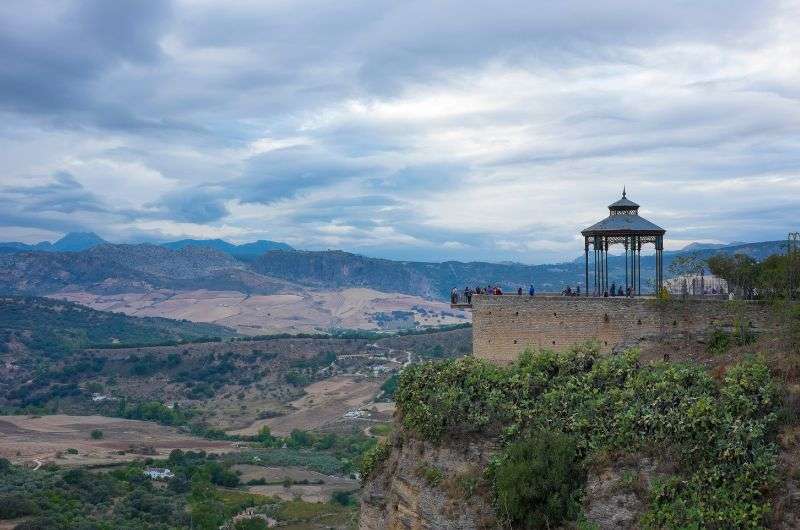
Time spent here: 30 minutes
If you’re up for one last view before you leave Ronda, walk to Mirador de Ronda, a viewpoint that’s part of a park called Paseo de Blas Infante. It’s near the bullfighting museum.
This time, you’ll be staring out beyond Ronda, and if you happen to be here at sunset, you might even think it’s the prettiest sunset you’ve ever seen.
Then again, just 1 hour 15 minutes away is the epic (and delicious!) Hacienda Fresneda María, so you could just hightail it there and wave goodbye to Ronda from the car window.
Day 10 of Spain itinerary: Granada, Montefrío
See my saved list of places for this Spain itinerary in Google Maps
Main sites visited on day 10: Alhambra, Albaicín, Sacromonte, Montefrío viewpoint
Restaurant tips: Bar los diamantes | Bar La Trastienda | Bar La Riviera
Hotel recommendations: Hacienda Fresneda María by Charming Stay
Further reading: Granada Guide| Day Trips from Granada | Top Places in Andalusia
Your main goal for the day? Seeing Granada’s Alhambra. It’s not a palace—it’s a whole city! And it’s as marvelous as they say it is. No over-hyping here.
Day 10—Granada—stop 1: The Alhambra
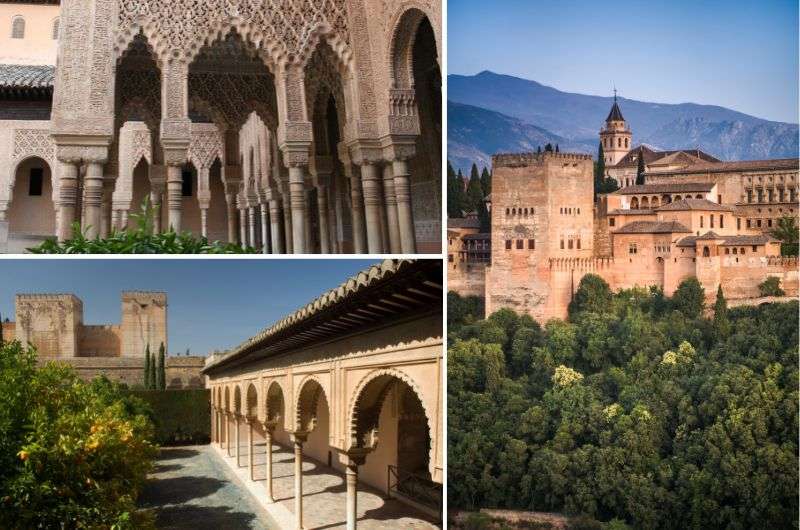
This is La Alhambra!
Time spent here: 4 hours
The Alhambra is the most impressive Moorish palace complex in the world. There’s a reason you need to buy your tickets months in advance.
It’s a sprawling complex that is a city of its own, meaning that 3–4 hour time expectation really isn’t exaggerated. It’s also on top of a hill, resulting in you having a great workout whether you want one or not.
The Alhambra is split into three main areas: the Alcazaba (fortress), the Nasrid Palaces, and the Generalife (gardens), and your ticket and passport will be checked when entering each of these areas.
I describe how to get to and from the Alhambra and what to see inside (and how not to miss your time slot for the Nasrid Palaces—the highlight) in great detail in my Granada Guide.
Important: Make sure to have your passport with you when you enter. Your ticket has your passport number on it and without a passport, you’ll be forced to buy another ticket at the entrance—if you’re lucky and they have any available. True story.
- Alhambra official website
- Enter through the Justice Gate (Puerta de la Justicia)
- Open daily 8:30 am–8 pm (closes at 6 pm from October to March)
- Tickets cost EUR 19 and must be purchased online in advance
Day 10—Granada—stop 2: Albaicín and Sacromonte neighborhoods
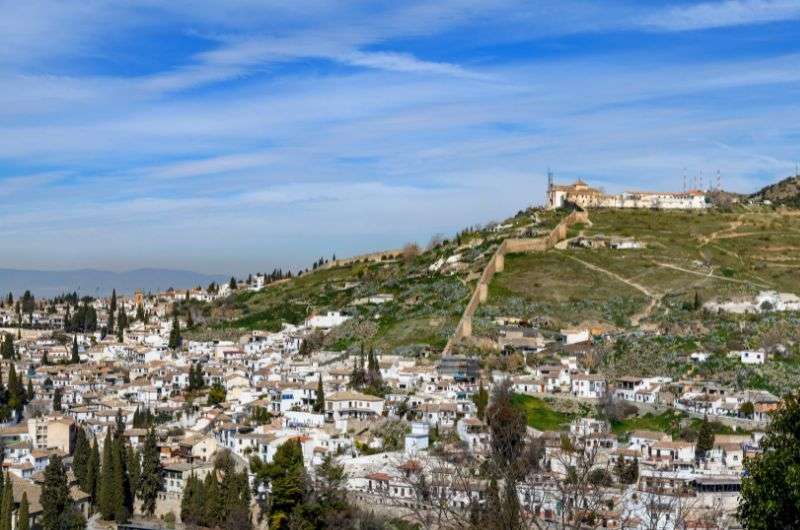
Albaicín and Sacromonte neighborhoods and the Montefrío!
Time spent here: 3 hours including lunch
The Albaicín and Sacromonte are neighborhoods in the hills beside the Alhambra. You know what that means—awesome views of the Alhambra!
Go to the Plaza de San Nicolás in Albaicín for the best ones, and even see the peaks of the Sierra Nevada in the background, with the entire city of Granada right below you.
In Sacromonte, the Gypsy quarter of Granada, the higher up you go, the better the views get. The dwellings in the Sacromonte neighborhood are carved right into the mountain. Visit the museum to learn more about these former cave homes, and even visit some recreated ones.
Hungry? Stop at one of the fantastic tapas restaurants around Plaza Nueva for the best restaurants: Bar los diamantes, Bar La Trastienda, or Bar La Riviera are all great choices.
Free tapas! Granada is famous for serving its tapas for exactly 0 money. You just pay for drinks and tapas land on your table! More drinks, more tapas, it’s delightful. More about the tapas culture in Granada.
Day 10, stop 3: Montefrío
On your drive back to Hacienda Fresneda María, make a detour to one of the ten villages with the best views in the world (as chosen by National Geographic, not me this time)—Montefrío.
To judge the view that won Montefrío its “best view” title, head up to the National Geographic viewpoint (Mirador del Paseo). It’s right on the road, so you can be done in a few minutes if you’re hurrying back to your hotel.
You can also head up to the castle, try to find some of Montefrío’s award-winning cheese, or see the peculiarly round church, Iglesia de la Encarnación, poking up from the village’s center.
More about Montefrío in my article about the Best Day Trips from Granada.
Day 11 of Spain itinerary: Nerja
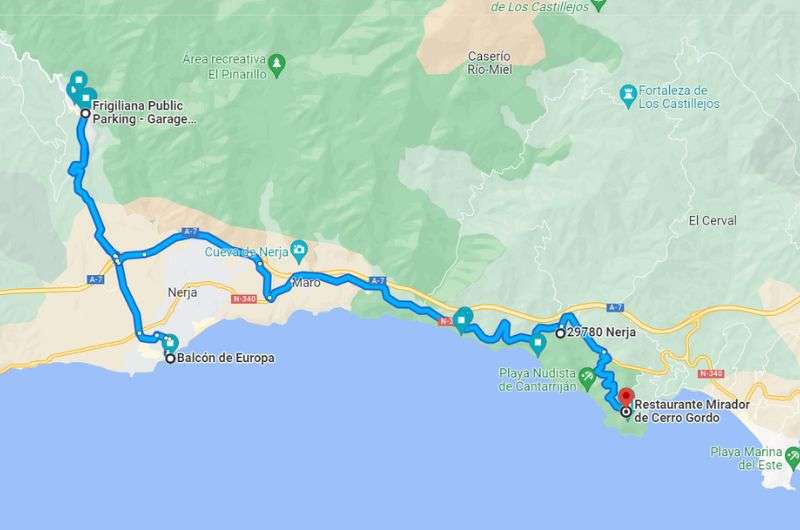
See the route of day 11 in Google Maps
Main sites visited on day 11: Balcón de Europa, Frigiliana, Cala del Cañuelo, Cerro Gordo Tower Viewpoint
Restaurant tips: Restaurant Marisqueria El Sacristan | El Casino| Chiringuito Las Piedras
Hotel recommendations: Hacienda Fresneda María by Charming Stay
Further reading: Best places in Nerja| Day Trips from Granada | Top Places in Andalusia
Today you’ll explore the area around Nerja. Nerja itself is just a meh town with one thing to see, so you’ll need to be ready to drive around a bit to see things that are actually worth seeing.

Another long driving day? Let’s do this!
Day 11—Nerja—stop 1: Balcón de Europa
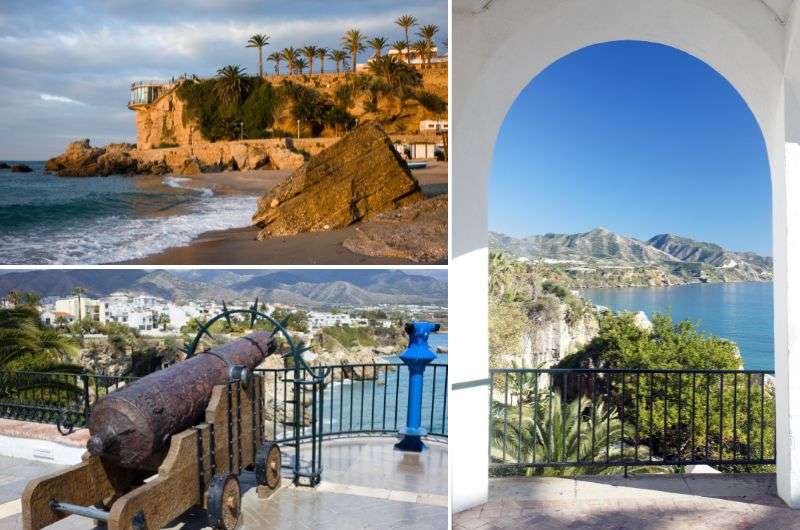
Views of and from Balcón de Europa
Time spent here: 30 minutes
That one place is the Balcón de Europa. It’s touristy, it’s crowded, but you know you wouldn’t be able to live with yourself if you missed it. So go, take a quick look at the views, and then hop right back into your car and head to Frigiliana.
Day 11—Nerja—stop 2: Frigiliana village
Time spent here: 2.5 hours including lunch
Drive 7 km (4 miles) up north from Nerja to a charming mountain village called Frigiliana, where the houses are white with flat brown roofs and the streets are narrow and full of flowerpots and random knickknacks.
The town is located in the mountains, so you can see not only over said brown roofs, but also all the way out to the sea. Marvelous! No wonder the expats love it here so much.
During your wander through the village, look for the 12 ceramic panels that depict the events that led up to the Battle of the Peñon of 1569.
You can also walk up to the castle ruins (Castillo de Lizar) for some spectacular views.
Tip: If you want to venture out into the nature around Frigiliana, see the hikes described in my Nerja article.
Like I mentioned, the expats love it here, and they also like to eat well, which is why you can get an awesome lunch in Frigiliana. Try Restaurant Marisqueria El Sacristan (seafood) or El Casino (Mediterranean).
You can’t drive on many of the roads in the village center, so just follow the signs ushering you to park at the large parking garage at the beginning of the village for something like EUR 1 per hour.
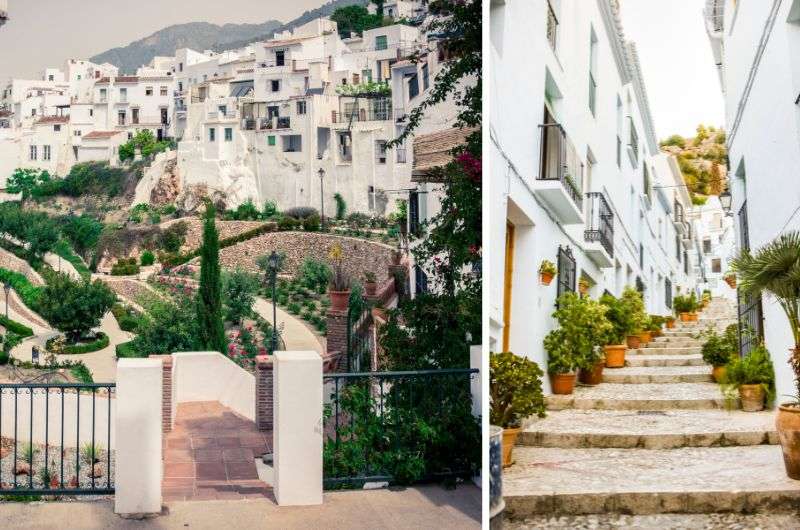
Frigiliana village
Day 11—Nerja—stop 3: Beaches
Time spent here: 1–2 hours
Nerja is a popular beach resort, so it would be naughty to not go to a beach while you’re in the area. I’m again going to usher you out of Nerja and into the surrounding area. It’s because I hate a crowded beach. If you don’t, Nerja’s El Salón and Carabeillo are the best options in town.
For something more serene, head out beyond Maro to find almost unlimited natural beach options.
I appreciate a good place to sit on a chair and grab a bite as much as the next person (no sandy crackers for me, thanks), so this is my tip for the best wild beach that also has a couple of establishments: Cala del Cañuelo. The restaurant further from the beach entrance, Chiringuito Las Piedras, is the far superior of the two options there.
You’ll need to put in some work to get there, though: it’s a 30-minute walk to Cala del Cañuelo from the parking. Or, in the summer, take a minivan for €2.
This beach and many others are described in my Best beaches in Spain article.
Day 11—Nerja—stop 4: Cerro Gordo Tower (viewpoint)
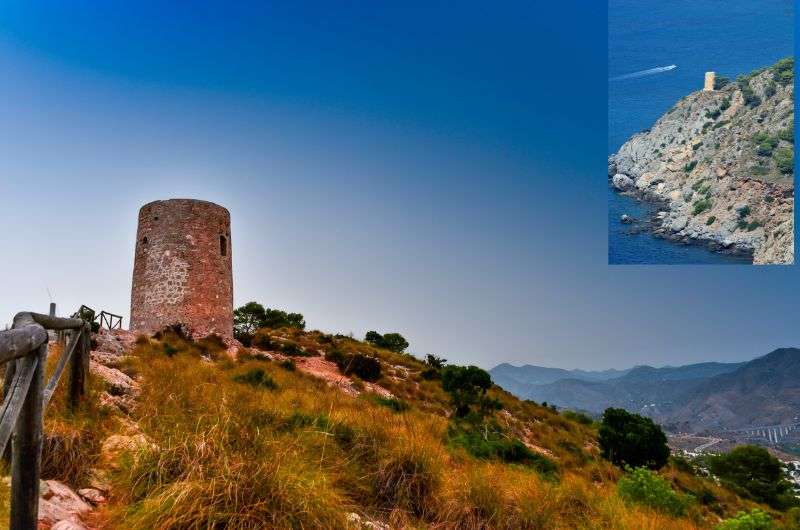
Cerro Gordo Tower
Time spent here: 1 hour
Looking for another perfect sunset to end your day? I’ve got a tower with a view for you.
To get to Torre Vigía De Cerro Gordo, park right next to the Restaurante Mirador de Cerro Gordo that is literally steps away from the viewpoints. I hope you packed a bottle of wine for the romance!
Day 12 of Spain itinerary: Caminito del Rey, El Torcal
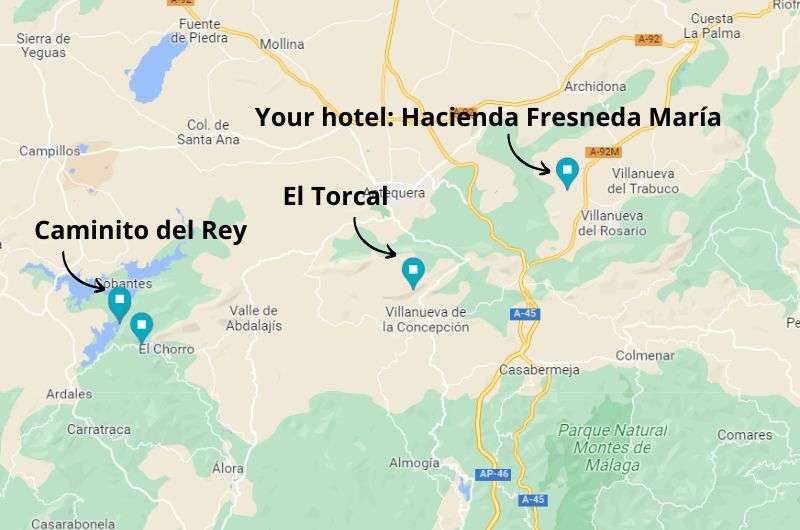
Your stops on day 12 of 14-day Spain itinerary
Main sites visited on day 12: Caminito del Rey, El Torcal Nature Reserve
Restaurant tips: Bar Restaurante La Ermita | Restaurante El Mirador Ardales | Restaurante Balcón del Sol
Hotel recommendations: Hacienda Fresneda María by Charming Stay
Further reading: Top Places in Andalusia | Andalusia in a Nutshell
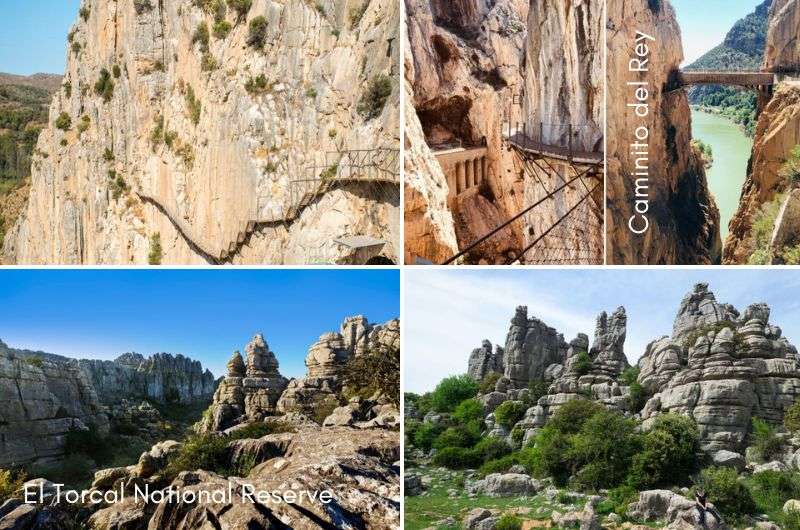
Adventurous day on Caminito del Reyl and in El Torcal National Reserve!
Day 12, stop 1: Caminito del Rey
Time spent here: 3.5 hours
Caminito del Rey is one of my top two destinations in Andalusia, and is the best nature spot I’ve visited in Spain, because it’s not only beautiful, but also exciting. Like me.
It’s a series of walkways bolted into the rock face 330 feet (100 m) above the gorge floor, so maybe also take a diaper if you can’t deal with heights.
Also take sun screen and a hat, because it gets unbearably hot! Don’t make the same mistake we did and think “oh, it’s a gorge, it’ll be in the shade”. NOPE.
Beware that you need to book tickets months in advance if you want to go without a guide. For guided tours, weeks in advance is usually enough.
Secret tip: If you get a guided tour and find out that your guide moves at the speed of a sloth, you can just ditch the tour and continue on your own (like we did). This could be helpful if you want to buy tickets for a day where self-guided tours are already booked solid.
The logistics of parking in the right spot, finding the tunnel to walk through and being at the reception area in time for your time slot, are a little complicated. I go into detail in my 10-day Andalusia itinerary.
The entire walk takes a minimum of 2 hours to finish and is mostly flat except for the final descent. I recommend leaving more time though, this is a place to be relished, not quickly walked through.
You’ll get a bus from the end back to the parking.
- Caminito del Rey official website
- Google Maps link to restaurant where you need to park
- Open daily 9 am–5 pm
- Tickets cost EUR 10 for self-guided tour, EUR 18 for guided tour, EUR 2.5 for bus. You need to get tickets in advance.
Day 12, stop 2: El Torcal Nature Reserve
Time spent here: 30 minutes–4 hours
Combine Caminito del Rey with El Torcal Nature Reserve (El Torcal de Antequera) for a full day trip.
El Torcal is a karst landscape that is pretty impressive unless you are from a country with many karst landscapes, in which case it won’t blow your mind. There are three main hiking routes at El Torcal and they are all easy, just range in duration from 45 minutes to 4 hours.
It’s on the way back to Hacienda Fresneda María, so why not. Or, don’t. There’s an infinity pool and fantastic food waiting for you back at the hotel. If you need a bit of rest by now on this Spain itinerary for 14 days, now’s the time.
Will your conscience eat at you if you don’t at least catch a glimpse? No worries, there’s a viewing area right by the visitor’s center. You can be in and out in 15 minutes, have a clean conscience, and still have time for the pool.
Day 13 of Andalusia itinerary: Malaga
See this map of day 13 of your Spain itinerary in Google Maps
Main sites visited on day 13: Old Town, Malaga Cathedral, Alcazaba, Gibralfaro Castle, Muelle Uno boardwalk
Restaurant tips: El Pimpi | El Tintero | Zury
Hotel recommendations: Hacienda Fresneda María by Charming Stay
Further reading: 20 Tips for Malaga | Andalusia in a Nutshell | Top Places in Andalusia
You’ll finish off your Spain itinerary with Malaga. I have a full article on the top things to see in Malaga with all the details, so I’ll keep it simple here and defer you to that article for the juicy extras.
Leave your car in Parking Muelle Uno, which has big parking spots by Malaga standards, and is close to where you’ll end your sightseeing today. The price changes depending on how long you stay, but EUR 2 per hour is a good benchmark.
Day 13—Malaga—stop 1: Old Town
Time spent here: 1 hour to infinity
Malaga has a charming enough Old Town (Centro Histórico). Straight away, I want to say it’s not going to be up to par with the other top cities in Andalusia, because they set the bar extra high. But much of the Old Town is pedestrianized, there are squares with fountains, shops, restaurants—the whole shebang.
The main shopping street is Calle Marqués de Larios. In the summer, it gets covered by canopies to provide much-needed shade. Plaza de la Constitución lies at the northern end of the shopping street. Yes, there’s a fountain!
Day 13—Malaga—stop 2: Malaga Cathedral
Time spent here: 1 hour
Malaga’s cathedral is the tallest cathedral in all of Andalusia and is lovingly called “La Manquita”, meaning “the one-armed woman”, because it’s missing one of its towers.
You can peek inside for free, but I think it’s worth taking a better look. You can buy a ticket to see all of the interior and the museum for EUR 8.
The best part is the rooftop tour. You will follow a guide up the 200 stairs (you can’t go on your own), and then walk the perimeter of the roof, taking in some cool views of the city.
- Google Maps link
- Opening times: Monday to Saturday 10am—6pm, Sunday 2pm—6pm. The rooftop generally opens one hour later than the cathedral, tours are every hour, on Sunday they start at 4pm.
- Tickets: cathedral and museum: EUR 8, just the rooftop: EUR 8, cathedral and rooftop: EUR 12.
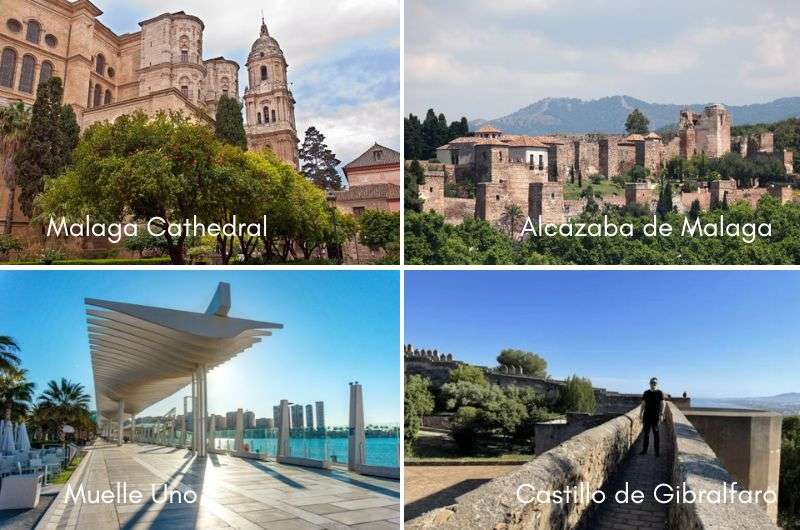
Here’s what you’ll see today!
Day 13—Malaga—stop 3: Alcazaba de Málaga (fortress)
Time spent here: 1 hour
On to Andalusia’s best preserved and most important Muslim fortresses—the Alcazaba de Málaga. It’s nicknamed “Little Alhambra” because of the similarities between the two, so I hope you enjoyed your time in Granada.
The Alcazaba is comprised of two walls, the outer one with watch towers. A path leads you through gardens with fountains and courtyards, in perfect Moorish style. You can walk around on your own or with a guide.
Right next to the entrance to the Alcazaba is the partially ruined Roman amphitheater that dates back to the 1st century BC, so check that out, too.
If you’re following this Spain itinerary in high tourist season (summertime), you have to expect lines for tickets up to 45 minutes long. You could get the guided tour and skip the queue if you’re as impatient as a monkey waiting for bananas.
- Alcazaba website
- Google Maps link
- Opening times daily 9am–6pm in the winter, until 8pm from April to October
- Tickets cost EUR 3.50 per person, or EUR 5.50 combination ticket Alcazaba+Gibralfaro
Day 13—Malaga—stop 4: Castillo de Gibralfaro
Time spent here: 1.5 hours
A short and sweaty hike up Mount Gibralfaro and you get to the castle that was built to protect the Alcazaba. If you don’t want to break a sweat, just take a taxi to Castillo de Gibralfaro instead.
There isn’t much inside the castle—the main draw are the views. You can see all of Malaga, including great sea views, which itself is worth the small entrance fee or EUR 3.50.
- Gibralfaro Castle website
- Google Maps link
- Opening times daily 9am–6pm in the winter, until 8pm from April to October
- Tickets cost EUR 3.50 per person, or EUR 5.50 combination ticket Alcazaba+Gibralfaro
Day 13—Malaga—stop 5: Muelle Uno
Time spent here: 1 hour plus dinner
Your last night in Spain! Are you sad? Excited to go home? Missing your cat?
Whatever you are, go to Malaga’s port promenade called Muelle Uno. The shops, restaurants and frequent events are all you need to chill out and keep your emotions in check.
There’s a white roof structure that shades part of the walkway from any remaining sun, and a huge, colorful glass cube, which isn’t just an art piece. It’s an artistic skylight that lures you into the Centre Pompidou underneath, the only of its kind outside of Paris.
At the end of the promenade you can take a peek at the La Farola Lighthouse. You’re also a few steps away from Playa de la Malagueta, Malaga’s most popular beach, if you prefer to spend your evening close to the seagulls rather than humans.
Hungry? My favorite restaurants in Malaga and details of all the highlights to see in the city in my full Malaga article. Or, find the very best of the best of Spain’s restaurants in another article.
Day 14 of Andalusia itinerary: Malaga and departure
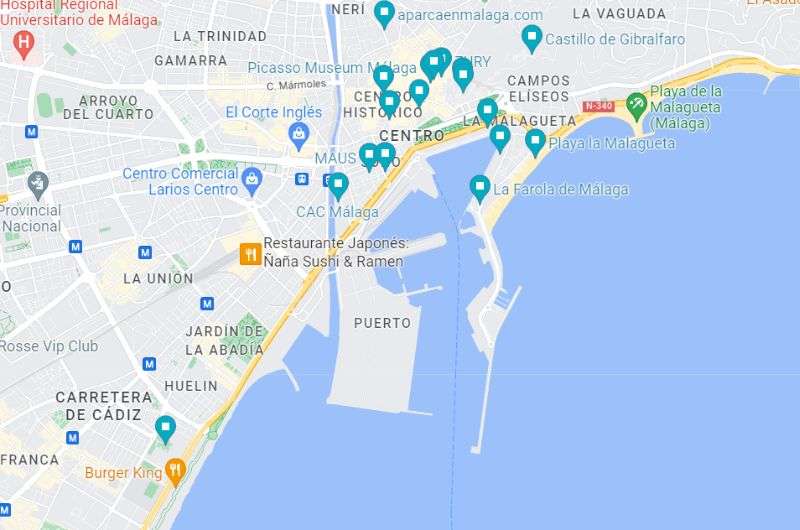
The blue dude at the bottom left is the Museo Automovilistico, everyone else is in Malaga’s center
Main sites visited on day 14: Picasso Museum, Museo Automovilístico, Soho, Malagueta Beach
Restaurant tips: El Pimpi | El Tintero | Zury
Further reading: 20 Tips for Malaga | Andalusia in a Nutshell | Top Places in Andalusia
This is the end.
You’ve already seen Malaga’s highlights yesterday, and who knows how much (or little) time you have left before your flight out today. So I’ll give you a few tips on what you could do to spend your time in Malaga, and highlight some great restaurants.
More details on everything Malaga in this article.
Day 14—Malaga—stop 1: The [?] Museum
There are a couple of museums worth a visit in Malaga. I’d choose from these:
First of all, the one thing Malaga has that other cities don’t, is the claim to Picasso’s birthplace. Hence the Picasso Museum.
You can look at pictures by and of Picasso housed in a nicely renovated building from the 16th century. There are over 200 pieces on display over 2 floors, though his most famous works are in other, more famous, museums of the world.
- Picasso Museum official website
- Google Maps link
- Open daily from 10 am, closes between 6 and 8 pm depending on the month
- Tickets cost EUR 9.50 and include an audioguide
OR, if Picasso sounds boring (not judging), and you’re more of a cars and fashion kind of person (or couple), the Automobile and Fashion Museum in Malaga, Museo Automovilístico, might be he perfect random museum to visit on your Spain itinerary.
This isn’t just a car museum, it adds haute couture and art into the installations, taking it to a whole new level. You get a great snapshot of the time period that is being portrayed, with information panels that tell the parallel stories of auto and fashion.
- Museo Automovilistico
- Google Maps link
- Open Monday to Saturday 10 am–2:30 pm and 4 pm–7 pm. Closed on Sundays.
- Tickets cost EUR 9.50
Day 14—Malaga—stop 2: Soho
Soho is an up-and-coming neighborhood west of the harbor with lots of murals and other urban art, perfect if you have a Bohemian streak.
You can also visit the CAC Malaga (contemporary art center) or see if the Teatro de Soho (performing arts center) is showing anything. Otherwise just browse the various art studios, quirky establishments and cool cafes.
Day 14—Malaga—stop 3: Malagueta Beach
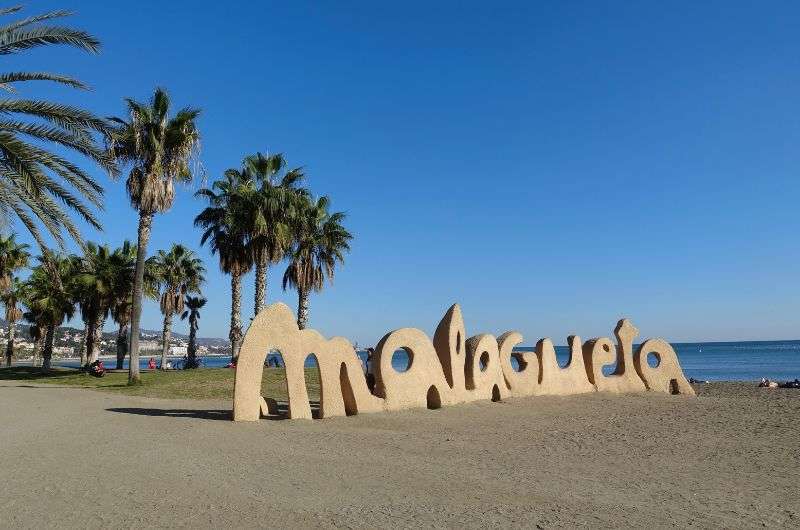
Welcome to Malagueta Beach!
Malagueta is a popular beach right in Malaga’s city center. If you decided to dip your toes in the water last night, you already know what I’m talking about.
It’s great mainly because it is a beach and everyone loves beaches! It didn’t make my top beaches in Spain list, but it could keep you happy for some last-day-in-Spain R&R.
Malaga restaurants
It’s been a busy 14 days in Spain, yes? You have had enough sightseeing and just want good food, yes? I’m happy to report that Malaga has some incredible restaurants, which well makes up for the fact that the city isn’t that amazing.
I have an entire section on the best restaurants in Malaga. Where to go for brunch, lunch, seafood and tapas is all detailed in my Malaga Guide.
Hint: Michelin went wild in Malaga!
This post contains affiliate links. I earn a small commission if you make bookings through my links, at no additional cost to you. This helps keep this blog free, thank you!


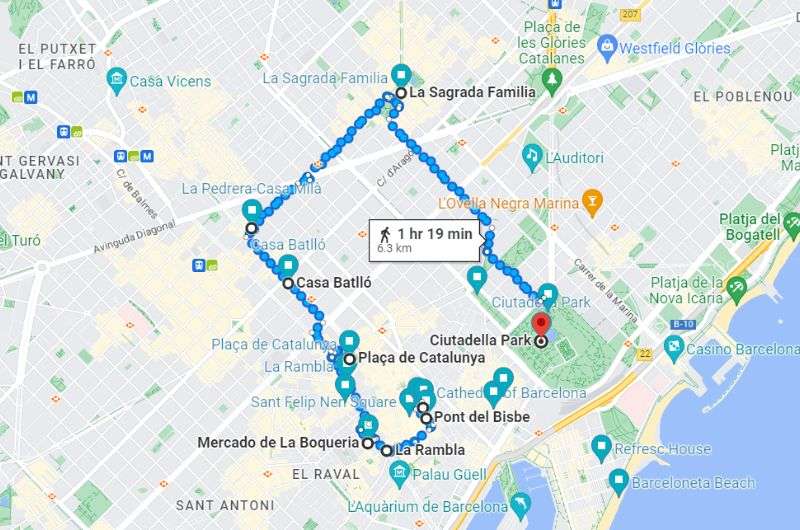
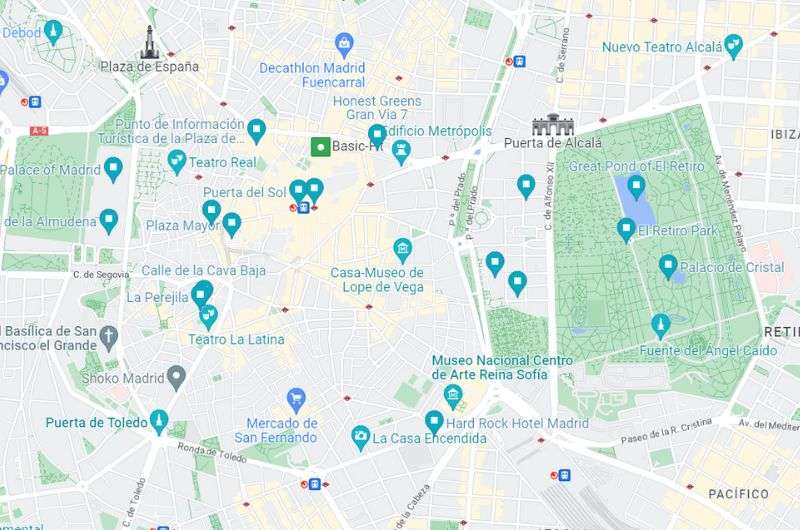
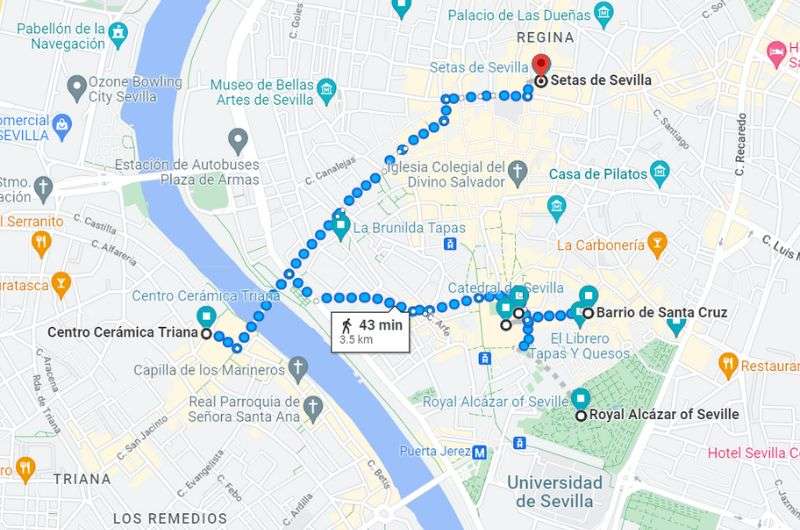
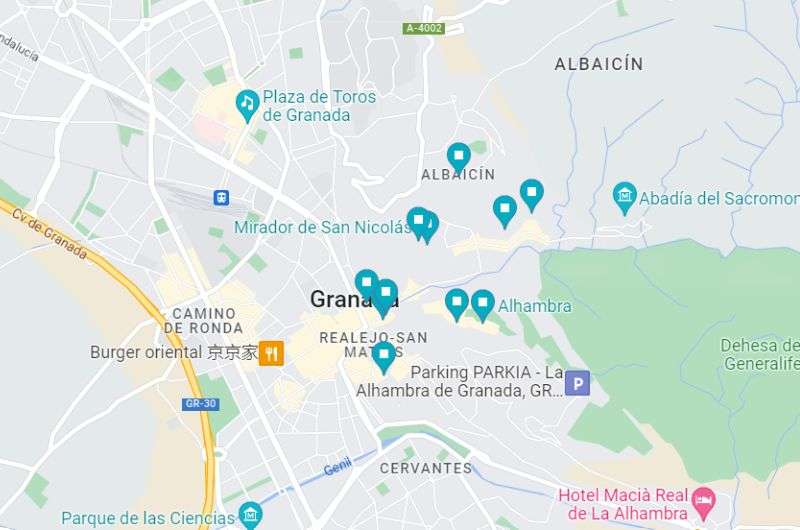
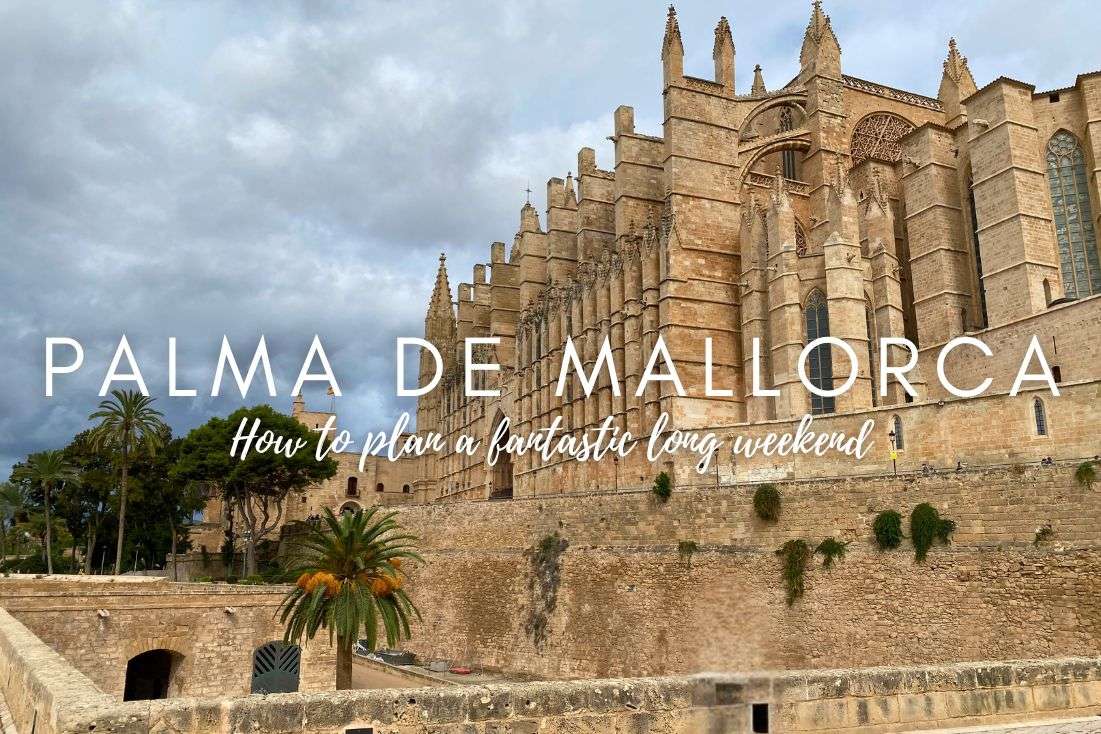
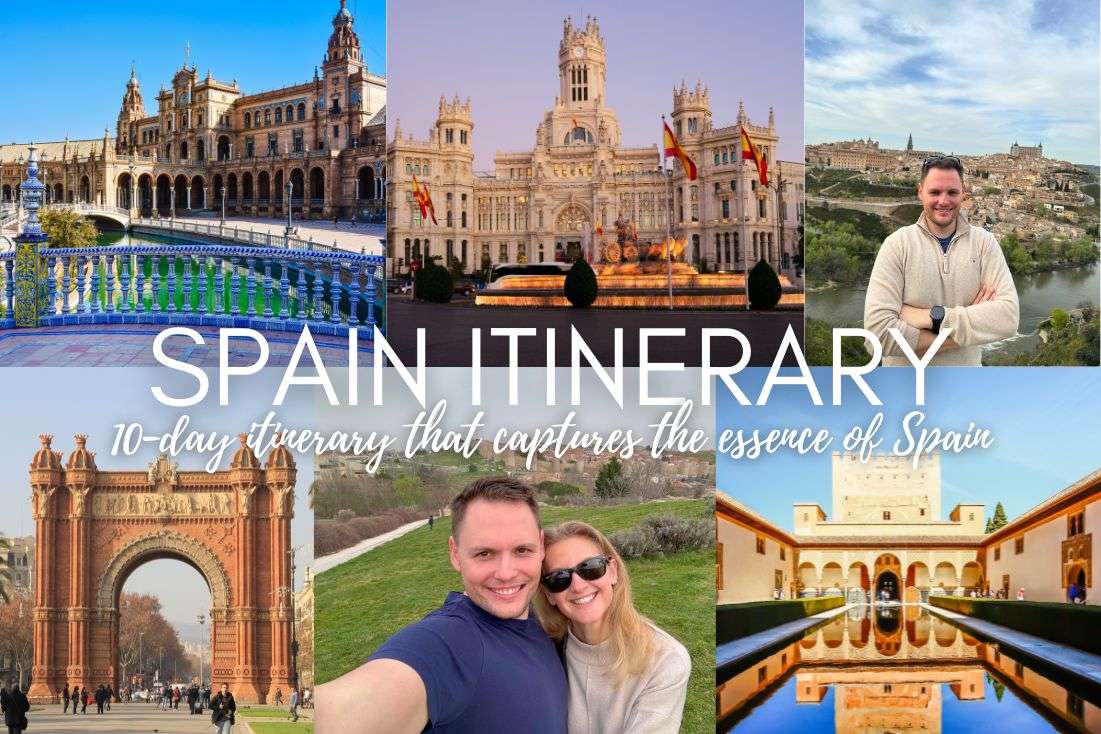
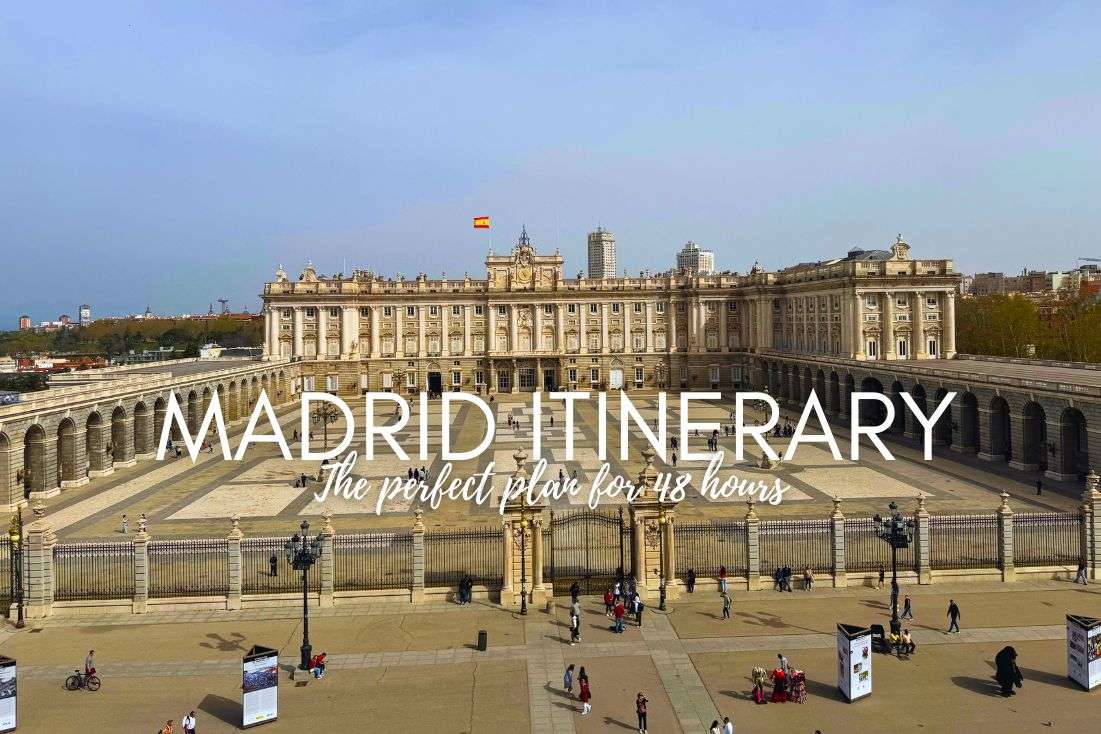





Comments | Thoughts? Give us a shout!